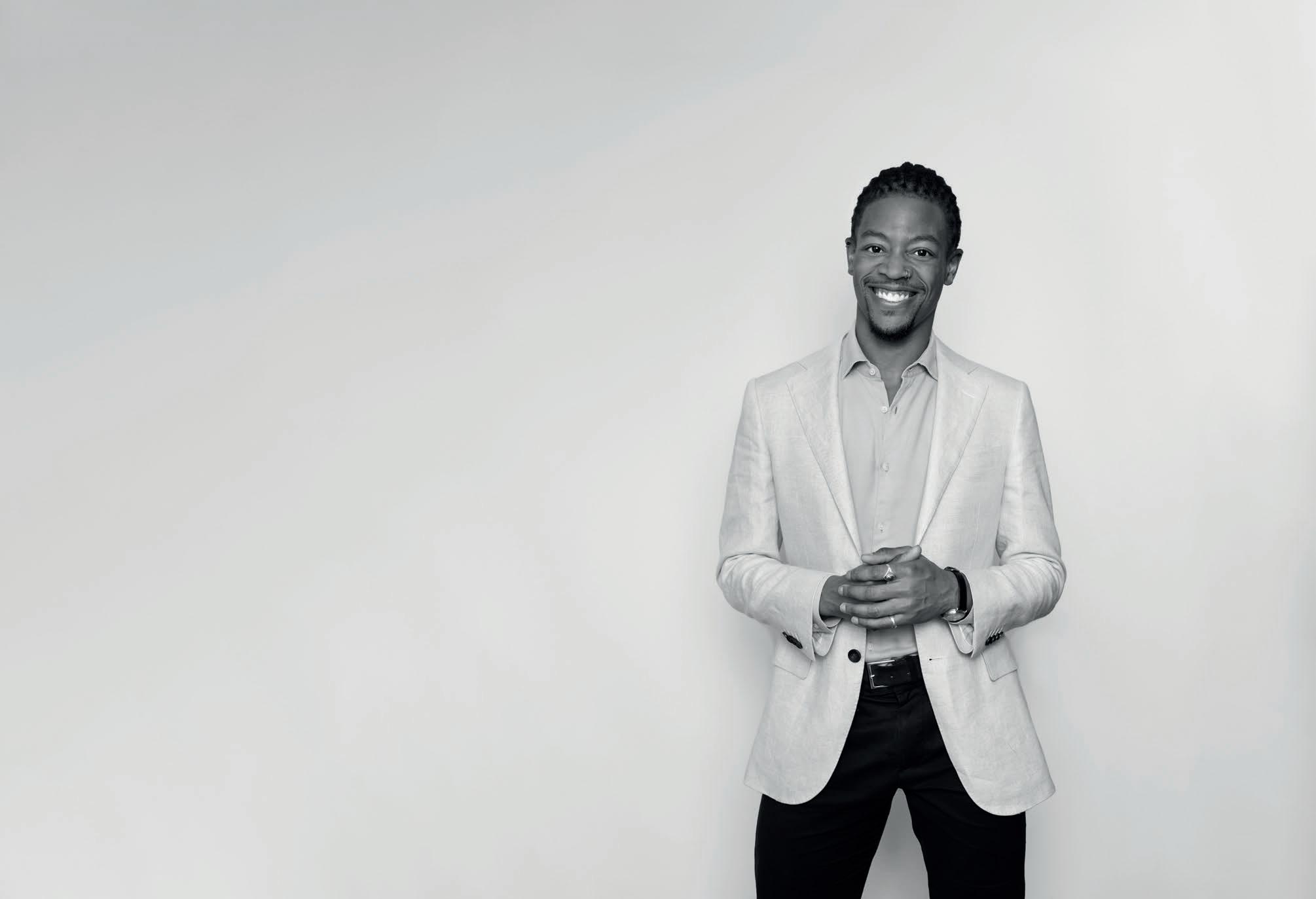

Tailored not uniform
When it comes to a good education, one size does not necessarily t all. MPW is one of the UK’s leading independent fth- and sixth-form college groups, offering a distinctive alternative to traditional schools. Our colleges blend a highly exible curriculum and unparalleled individual support with a socially relaxed, mature environment.
A levels and GCSEs in over 40 subjects, plus Easter Revision courses, retakes and Year 12 transfers
Outstanding 1:1 academic and pastoral support
Oxbridge-style tutorial groups with nine students or fewer
Excellent results and progression to top tier universities
Easter Revision courses
Best in class inspection reports from the Independent Schools
Inspectorate (ISI)
Discover MPW for yourself
Visit www.mpw.ac.uk or call us to book your visit.
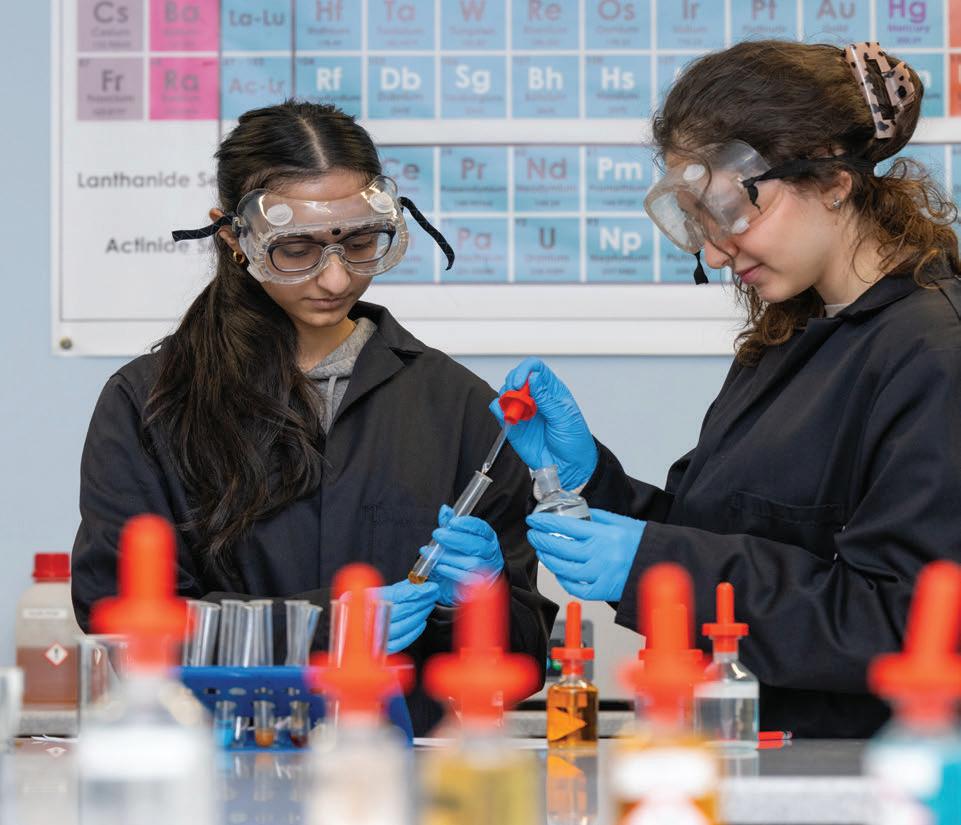

Students make rapid progress from their various starting points, in small-sized classes, due to highly e ective specialist teaching and closely focused pastoral support.
MPW London Independent Schools
Inspectorate Report

























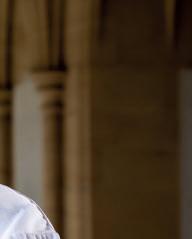






CONTEN TS
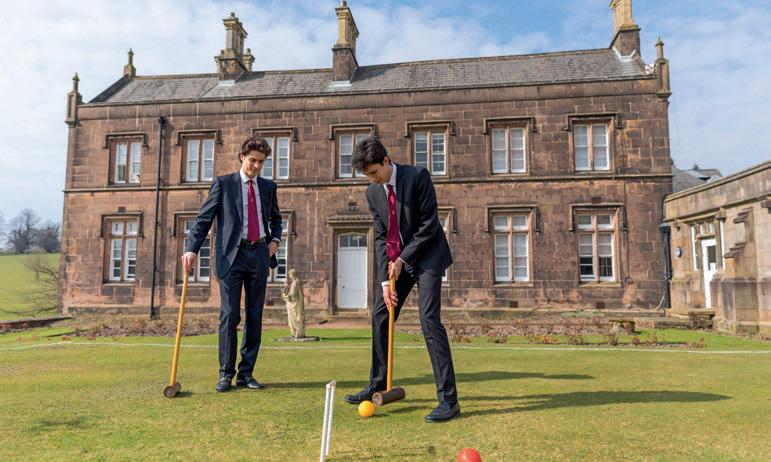
REGULARS
TOP SCHOLAR
17-year-old Cecily at Brighton College SENIOR HEAD VIEW
Su Wijeratna, Latymer Upper School MUSIC HEAD VIEW
Philip Dukes, Marlborough College HEAD VIEW
Matthew Bryan, Kingswood House School
INSIDERS’ GUIDE
Experts tell Eleanor Doughty all there is to know about gaining a bursary CLASS ACTS
Evie Calver spotlights exceptional bursary students across the country

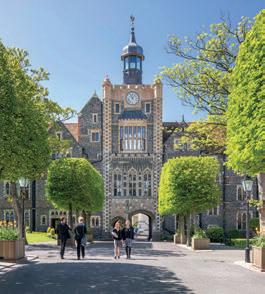
Alice Smellie tells the story of Reed’s School’s inspiring
Education
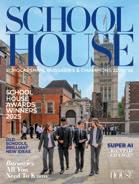
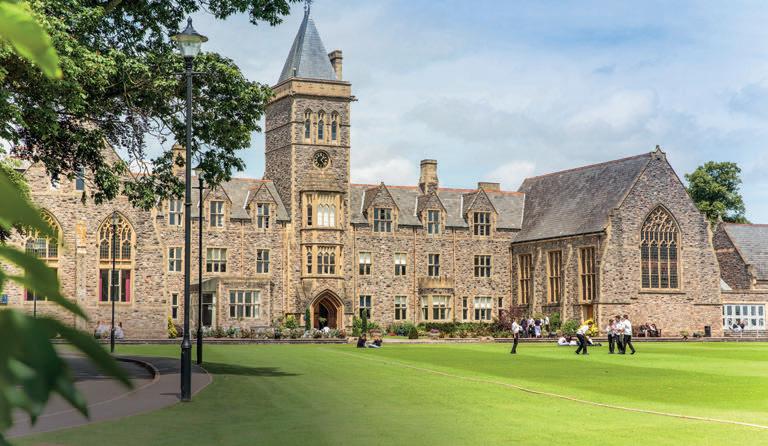
Editor’s LETTER

Oc tober is becoming my favourite month. Whether your tastes run to spotting badgers and wild boar as they nd food for winter or attending the BFI London Film Festival for cultural inspiration, it’s reliably calm and predictable. School is in and routines are keeping us all sane. e promise of a half-term is on the horizon. And all around are the warm, cheerful colours of autumn.
All of this makes October a good time to think about others – and how we can share our good fortune and opportunities. is is what the Scholarships, Bursaries & Champions issue is all about: the widest sense of community and support. So it’s always a delight to introduce the winners of our annual School House Awards, which recognise outstanding work in sectors running from sustainability to pastoral care, mental health provision to outreach and charitable work. Turn to page 15 to nd out who won – and why. is month, we’re focusing on one of the most inspiring independent schools you can imagine: Reed’s School in Surrey (p39), which specialises in exceptional pastoral care, including for those pupils who have been through challenging circumstances. Set up more than 200 years ago, Reed’s essential mission is unchanged – but there seems to be more need for it than ever. ere are lessons in essential philanthropy in Old Schools, New Ideas (p26), which takes a look at four of the UK’s very oldest schools: Christ’s Hospital School, Stonyhurst College, Rugby School and St Peter’s School, York. With a combined age in the region of 3,000 years, all have their eyes xed rmly on the future and what steps must be taken to ensure they prosper and thrive in the centuries to come.
For the freshest set of parents, this issue’s excellent Insiders’ Guide (p44) focuses on how to achieve a bursary. From nance to timing, it’s everything you really need to know, direct from the bursar’s o ce. Plus, there is plenty of inspiration in Class Acts (p48), our regular showcase of past and present bursary students. ey really are an impressive set of young people.
And, as ever, we are proud to present lots of fascinating opinions and comments from heads around the country, including a particularly thoughtprovoking column about AI’s place in education (p52) by managing director of Duke’s Education, David Goodhew.
I do hope you enjoy it.


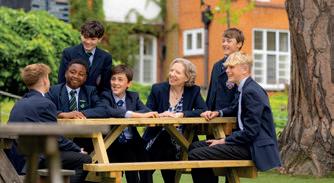

Roedean – Insiders’ Guide, p44
Taunton School – Class Acts, p48
Farleigh School – Charity News, p20
Reed’s School – On A Mission, p39








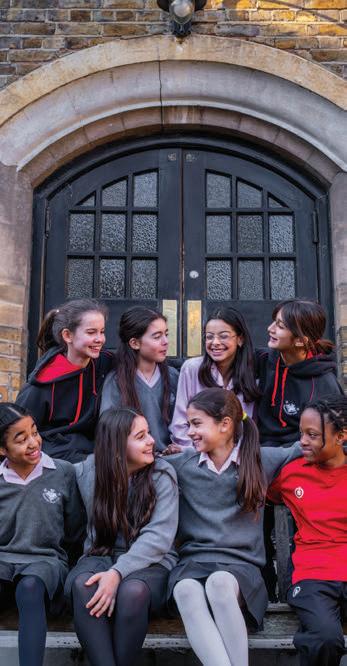


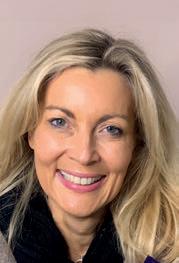


ALICE SMELLIE
Alice Smellie is an author, journalist, and speaker. As well as writing for national newspapers and magazines, Alice gives talks to companies and schools about women’s health, is the co-author of Cracking the Menopause with Mariella Frostrup, and co-founder and director of campaign group Menopause Mandate. She lives in Somerset with her three children and two badly behaved working cocker spaniels.
EVIE CALVER
Evie Calver trained as a classical violinist for ten years at the Yehudi Menuhin School, where her education was supported by the UK Music and Dance Scheme. She later left the music world behind in favour of gaining a rst-class English degree from King’s College London and a postgraduate quali cation in journalism, which led her to School House. Most of Evie’s free time is spent in the kitchen, where she is usually cooking up a new gluten-free recipe.
SUSAN WIJERATNA
Head of Latymer Upper School, Susan Wijeratna oversees the school’s sectorleading bursary programme and its forward-thinking and rounded approach to education. Previously the rst female lower master at Eton College and deputy head at St Paul’s Girls’ School, she is also chair of governors at St Stephen’s CE Primary School, working to ensure that children from diverse backgrounds have access to outstanding opportunities.
SCHOLARSHIPS, BURSARIES & CHAMPIONS 2025/26
CONTRIBUTORS

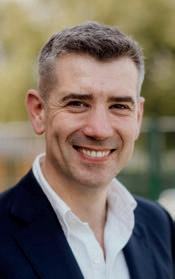
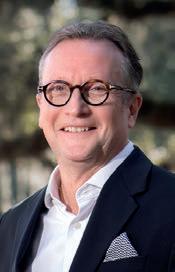
ELEANOR DOUGHTY
Eleanor Doughty specialises in writing about old money and everything associated with it for e Times, Financial Times and e Telegraph, where she writes the Great Estates series. She has written for School House since 2017. Her debut book, Heirs and Graces, A History of the Modern British Aristocracy was published on 4 September by Hutchinson. When Eleanor is not writing, she can be found out walking with her cocker spaniel.
MATTHEW BRYAN
As headmaster at Kingswood House School in Epsom, Matthew Bryan is committed to the ideals of opportunity and inclusivity for young people. Part of this commitement involves refusing to engage with Surrey’s fondness for 11+ extrance tests. A keen student of educational theory with master’s degrees from Cambridge and Oxford, his background is in teaching Latin and Greek at a range of public and prep schools in London and the South East.
PHILIP DUKES
Philip Dukes is recognised as one of the world’s leading viola players with a career that has spanned over 30 years. He is an accomplished concerto soloist, recitalist and chamber musician. He joined Marlborough College as artistic director in 2008, and is a fellow of the Guildhall School of Music and Drama and honorary associate at the Royal Academy of Music. Philip began his musical education at Wells Cathedral School in Somerset.

country’s leading Catholic prep school for boys aged 4-13







































































































































































































VICTORIA LAMBERT EDITOR
CAMILLA VAN PRAAGH
PUBLISHER
EDITORIAL DIRECTOR LUCY CLELAND
DEPUTY EDITOR LUCINDA BARING
MANAGING EDITOR TESSA DUNTHORNE
JUNIOR SUB EDITOR & PRODUCTION ASSISTANT EVIE CALVER
CONTRIBUTING EDITORS
ALICE SMELLIE, ELEANOR DOUGHTY
CREATIVE & PRODUCTION DIRECTOR PARM BHAMRA
DESIGN & PRODUCTION MIA BIAGIONI
ONLINE CONTENT DIRECTOR REBECCA COX
DEPUTY ONLINE EDITOR ELLIE SMITH
ONLINE CULTURE EDITOR OLIVIA EMILY
ONLINE STYLE EDITOR CHARLIE COLVILLE
ONLINE ASSISTANT ISABEL DEMPSEY
SOCIAL MEDIA MANAGER MCKENZIE MULLANY
ASSOCIATE PUBLISHER ELLIE RIX
HEAD OF FASHION EMMA MARSH
HEAD OF BEAUTY BANDI MANZINI
SENIOR ACCOUNT DIRECTOR PANDORA LEWIS
ACCOUNT DIRECTOR SERENA KNIGHT
DIGITAL BUSINESS DEVELOPMENT DIRECTOR JOEY GOLDSMITH
B CORP & PROJECTS MANAGER XA RODGER
TECHNICAL DIRECTOR MARK PEARSON
CHIEF FINANCIAL OFFICER GARETH MORRIS
FINANCE CONTROLLER LAUREN DELGADO
FINANCE ADMINISTRATOR RIA HARRISON
ACTING FINANCE ADMINISTRATOR KLODI SADE
HUMAN RESOURCES CONSULTANT ZOE JONES
CHIEF COMMERCIAL OFFICER TIA GRAHAM
CHIEF OPERATING OFFICER JAMES THROWER MANAGING DIRECTOR JEREMY ISAAC
EDITORIAL ENQUIRIES victorialambert@schoolhousemagazine.co.uk ADVERTISING ENQUIRIES camilla@schoolhousemagazine.co.uk
SCHOOL HOUSE is a biannual magazine published with Country & Town House magazine and distributed to AB homes in Barnes, Battersea, Bayswater, Belgravia, Brook Green, Chelsea, Chiswick, Clapham, Coombe, Fulham, Hampstead, Highgate, Holland Park, Kensington, Knightsbridge, Marylebone, Mayfair, Notting Hill, Pimlico, Putney, Richmond, South Kensington, St John’s Wood, Wandsworth and Wimbledon. It is also on sale at selected WHSmith, Sainsbury’s, M&S, and Waitrose stores and independent newsagents nationwide. School House is published by Country & Town House Ltd, Studio 2, Chelsea Gate Studios, 115 Harwood Road, London SW6 4QL (tel: 020 7384 9011). Registered number 576850 England and Wales. Printed in the UK by William Gibbons and Sons Ltd, West Midlands. Paper supplied by Gerald Judd. Distribution by Letterbox.
Copyright © 2025 School House. All rights reserved. Reproduction in whole or in part without written permission is strictly prohibited. Materials are accepted on the understanding that no liability is incurred for safe custody. The publisher cannot be responsible for unsolicited material. All prices are correct at the time of going to press but are subject to change. While every care is taken to ensure all information is correct at the time of going to press, it is subject to change, and School House takes no responsibility for omissions or errors.
WHAT TO DO WITH SCHOOL HOUSE WHEN YOU’VE FINISHED READING IT...
Ideally, we’d love you to pass it on to a friend or a community place which might enjoy it (doctor or dentist surgery, community centre etc), but you can also rest assured that your issue can be recycled.





TOP SCHOLAR
BRIGHTON COLLEGE

Cecily, 17
There’s no better place than Brighton College for pupils who want to be fully immersed in life, says 17-year-old Cecily. And she would know.
Cecily joined the East Sussex co-educational boarding and day school in year nine, and has loved every moment of her time there. Currently taking A levels in maths, further maths, physics and chemistry, Cecily hopes to read natural sciences at Cambridge. Longer term, she sees that translating to a career in scienti c research.
But although she is academic, Brighton has allowed Cecily to pursue a wide range of passions. ese have included featuring in a number of school productions, helping raise £4,000 for charity by staging a play and a fashion show, and achieving her Gold Duke of Edinburgh’s Award. She has even joined the school’s coding club and Shakespeare society – and still nds time for knitting and jazz.
Cecily is currently head of school, and was a prefect last year, which meant being part of weekly meetings with sta and touring prospective families around the school. It follows a history of taking
her turn on other pupil bodies including the boarding council, student council and her house council. ‘You can always get heard,’ she says. Pupil campaigns have led to free period products in lavatories and a big recycling hub.
‘Everyone is very friendly here,’ Cecily adds. ‘As a boarder, I live with my friends and have access to the teachers onsite. You feel so welcome; there’s never a problem settling in. e community is amazing.’
Her one piece of advice to pupils contemplating Brighton is simple: ‘Do it.’ She explains: ‘When I joined, I was quite shy – I liked maths and that was it. Now I play water polo and am auditioning for a musical. Earlier in the year, I launched a satellite into space as part of a national competition.
‘Here, you can be open to everything. Just remember to enjoy it. You don’t realise how quickly time goes.’
She adds: ‘Brighton instils a belief in us that we are citizens of the world and that, with respect and kindness, we can make changes. Wherever I end up, I’m going to want to follow those values taught to me here.’ n
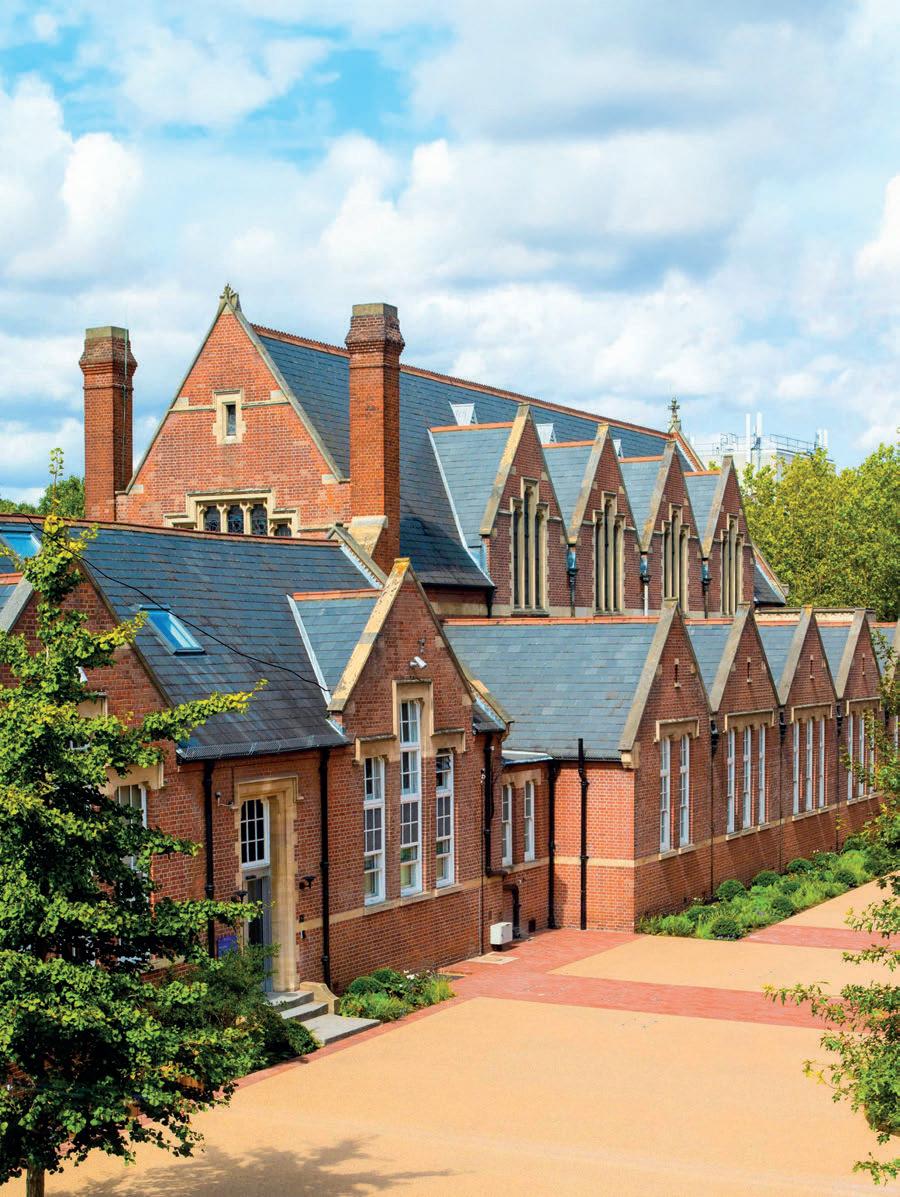
A DYNAMIC FOUNDATION
There is no excuse to stand still when it comes to expanding students’ opportunities, says Susan Wijeratna, head of Latymer Upper School
It is our responsibility to educate young minds. It is also our responsibility to shape them in a way that prepares them to thrive in an ever-evolving world. e external challenges facing education today are formidable, but we remain undaunted by these pressures. Latymer Upper School leads by example in how we further advance our curriculum, expand our bursary programme and build a truly inclusive, forward-thinking educational community.
We have done this by keeping our driving force simple with the belief that education should be as dynamic as the world it serves. Our reformed Middle School Curriculum, which will, in the main, replace GCSEs, a proactive step towards ensuring our students are equipped with the subject knowledge, depth of learning, interdisciplinary skills and mindset they need to excel in life beyond the school gates. Our students will be even better prepared to thrive not just in the classroom but in life, as they face the same rapid technological advances and global shifts that are reshaping our society. Today, Latymer is a blueprint for what the future of education can and will be: modern, inclusive, forward-thinking and uncompromising in its pursuit of excellence.
But the curriculum is only one part of the equation. If we are to continue as leaders, we must ensure that the very foundation of our school is built on principles of inclusion, equity and opportunity for all.
in the UK. e recent success of our 400th anniversary Inspiring Minds campaign and the unwavering generosity of our community have allowed us to ensure that bursaries remain at the core of the school.

‘In a society where opportunity is so often intrinsically linked with privilege, Latymer stands firm in its belief that every talented student deserves a chance to shine’
This is why our bursary programme is so central to our mission. Over the past decade, we’ve made incredible strides and we are now in a position to o er one in four of our Upper School students a bursary – one of the largest nancial assistance o erings
Our commitment to bursaries is part of our broader vision of shaping a diverse, vibrant life here at Latymer and allows us to be part of the solution to the problem of social mobility. As the world becomes more complex, we must ensure that we remain a place where all bright and ambitious students, regardless of background, can nd their path to success. is year, we saw a notable increase in the number of students accepting bursaries, a clear indication that our e orts are resonating.
But we are not stopping here. Our long-term goal is need-blind admissions, ensuring that no academically excellent child is turned away because of their financial background. In a society where opportunity is so often intrinsically linked with privilege, Latymer stands rm in its belief that every talented student deserves a chance to shine.
The energy that flows through our school, from the enthusiasm of our students to the dedication of our sta , is a heartfelt and true reflection of the wider vision we have for the future. Latymer has always been a place where innovation meets tradition; where excellence in education is not just about academic success but about developing individuals who can think for themselves, lead with empathy and face the world with con dence, so they can shape it for themselves and the generations that follow. n
Susan Wijeratna joined Latymer Upper in London in September 2023
A SPECIAL RHYTHM
Philip Dukes, artistic director of Marlborough College, on the integral role of music in school
At Marlborough College, we are often asked what kind of music education we provide, but I hesitate to use that term. What we o er is more than education in music – it is education through music, a lens through which young people come to understand themselves and the world around them. Music fosters discipline, empathy, creativity, resilience, and – crucially – emotional intelligence. In that sense, it re ects everything that a rounded, liberal education should provide.
Rather than sitting in isolation, the music department at Marlborough beats in step with the rhythm of college life, o ering both an open door to musical exploration and a specialist pathway for those whose ambitions lie in professional music. We are deeply proud of our track record, and, in recent years, Marlborough pupils have gone on to study at the UK’s leading conservatoires, at Oxbridge with music scholarships, and at world-renowned US institutions. is level of success is the result of careful nurturing, expert teaching and a community ethos where talent is celebrated.
Music at Marlborough is not an elite pursuit hidden behind practice room doors; it is visible, participatory and inclusive. From chapel services to chamber concerts, jazz nights and musical theatre to house music competitions, our musical events ll every corner of the calendar. At the heart of this culture are our music scholars. ese are pupils of outstanding musical potential and promise; more than that, they are leaders, role models, and contributors to broader college life. We have found that the presence of elite young musicians draws others in, inspiring less experienced pupils to try something new.
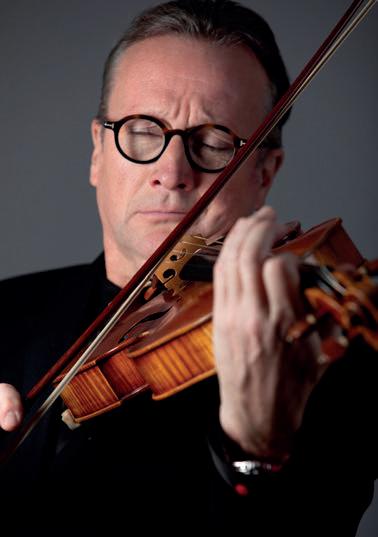
cost need not be a barrier to opportunity. Additionally, the Director of Music Scholarship Fund allows us to provide bespoke support, which can range from providing access to instruments, competition entry or masterclass attendance. Our unique partnership with Sinfonia Smith Square o ers pupils an extraordinary chance to rehearse and perform alongside career musicians. Yes, it’s about learning repertoire, but it’s also about absorbing the discipline, focus and ful lment that come from working alongside professionals. ese moments often prove pivotal – not just in musical development, but in forming lifelong con dence and purpose. Friendships are forged in rehearsals, con dence built in performance, and community found in shared applause.
‘Music fosters discipline, empathy, creativity, resilience and emotional intelligence – everything that a rounded, liberal education should provide’
We are also absolutely committed to accessibility. A Marlborough Music Scholarship brings with it up to three free instrumental lessons per week, which represents signi cant support for developing musicians. For pupils with exceptional talent and nancial need, we can o er bursarial support, ensuring that
Elite performance, when nurtured well, elevates a school and shows what is truly possible. But in turn, elite young musicians are themselves elevated by the depth and breadth of a Marlborough education. At the same time as they are practising scales, they are also reading literature, solving equations, playing sport, and engaging in conversations that challenge and enlarge their thinking. is broad foundation is an essential component of an education that fosters balance and creates the kind of thoughtful, articulate pupils who we hope will go on to shape the future of the arts. We believe, fundamentally, that music is not an extra. It is an essential part of being human. So, what do we o er, and why does music matter? We o er world-class tuition provided by over 30 professional musicians, unique performance opportunities, and a culture that values both the pursuit of excellence and the joy of participation. But above all, we o er the chance to fall in love with music – for life – and a belief that music doesn’t just educate the mind or train the ear, but nourishes the soul. And that, in the end, is what makes it so vital. n
Philip Dukes joined Marlborough College in Wiltshire in 2008
PHOTO: BAILEY DAVIDSON
SCHOOLHOUSE MAGAZINE SCHOOLHOUSE MAGAZINE 2025 AWARDS










An array of impressive schools have taken the laurels this year, says Victoria Lambert. So many brilliant entries, so many deserving school communities – but as ever, only one can triumph in each category. And so here are this year’s School House Awards winners…



THE JUDGING PANEL

VICTORIA LAMBERT Editor, School House
Victoria Lambert is School House’s editor. She is firmly in favour of a rounded education that brings out the best in every child.

DR EMEKA OKOROCHA
School House doctor and author
Dr Emeka is an NHS doctor and private GP working in London and Kent, and is also a media personality.

ANNABEL HESELTINE Writer, broadcaster and podcaster
Environmentalist Annabel Heseltine writes on conservation for The Telegraph, The Ecologist and Resurgence
THE WINNERS
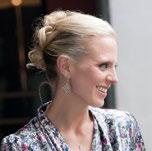
LUCY CLELAND
Editorial director, Country & Town House
Lucy Cleland has worked in the magazine industry for over 20 years and is driving Country & Town House’s sustainability agenda.
With so many stellar entries, choosing the winner in each category was difficult, time-consuming and caused much debate. So how did the judges reach their decisions?

Social Mobility Champion
(Sponsored and judged by Christ’s Hospital School)
WINNER: DULWICH COLLEGE, London
One of the most vital functions of modern independent schools is how well they improve the life chances of their least privileged students, something Christ’s Hospital is widely admired for. The shortlist for this award consisted of Dulwich College, Sedbergh School and Wellington College. Our winner demonstrates significant commitment to social mobility, says Christ’s Hospital’s director of development, Hugo Middlemas, both in the scale of its bursary provision and breadth of educational partnerships. ‘What is encouraging is that Dulwich College is growing the number of its bursary recipients at a time when many schools are cutting their support for disadvantaged pupils,’ says Middlemas. ‘Its story is one of truly serving the community of London, deeply engaging with schools across the city to identify young people who could benefit from a transformative Dulwich education, as well as representing the rich diversity of the London population.’

Animal Support Champion
(Sponsored and judged by Farms for City Children)
WINNER: THE DOWN’S MALVERN, Herefordshire
There’s plenty of animal magic at each of our top three schools –Sedbergh, St Ronan’s and The Down’s Malvern – so the judges had their work cut out for them. But in the end, Susannah Mair, corporate fundraising manager at Farms for City Children, explains why The Down’s Malvern won. ‘The school’s animals are a catalyst for transformation. They spark curiosity, help anxious or quiet children find their voice and connect the school community in moments of wonder,’ Mair says. ‘Children learn the realities of food provenance, sustainability and the field-to-fork journey. From comparing heritage breeds with commercial livestock to pressing apples in the orchard and feeding the pulp to the pigs, every interaction deepens their understanding of responsible consumption. Children are not just visitors – they are farmers, carers and advocates for the natural world.’

Local Partnership & Community Champion WINNER: DULWICH COLLEGE, London
This award celebrates the way schools interact and integrate with the world around them. Important work is being carried out countrywide but three schools stood out: Eton College, Wellington College and Dulwich College, with the latter taking the honours. As Lucy Cleland explains, the school impresses in how it ‘mobilises its entire community in a coordinated act of service that delivers measurable benefit to local schools and charities’. For example, the 2025 annual Dulwich Service Day saw over 850 senior school pupils and more than 150 staff volunteer with 53 community initiatives, including food banks, environmental projects, care homes, youth clubs and state primary and special schools.

Pastoral Care Champion
WINNER: BANCROFT’S SCHOOL, London
The three finalists in this category – Bancroft’s School, Lancing College and Cheam School – were outstanding. But Bancroft’s was a clear winner for the way it responded when affected by tragedy. Within the last two years, the school community has endured the devastating, high-profile deaths of one alumnus and one pupil, with the latter being only 14. In response, all staff received trauma training, and one-to-one care was provided where needed. The school’s open-door ethos was crucial in helping pupils process grief, while rituals such as the creation of a memorial garden offered solace and strength. Dr Emeka Okorocha, the judge of this category, says: ‘With great challenges bring great opportunities to demonstrate your abilities to adapt and overcome hardship, and I believe that’s exactly what this school has done.’
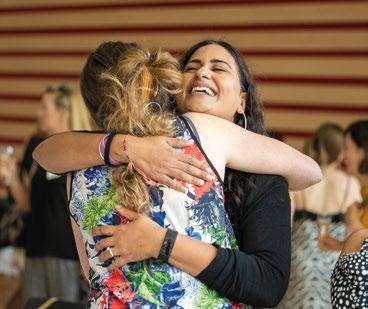
Alumni Relationships Champion
WINNER: NOTTING HILL AND EALING
HIGH SCHOOL, London
Notting Hill and Ealing High School, Sherborne School and Bryanston School all show how lifelong relationships can be forged between pupils and their schools. The winner – Notting Hill and Ealing High School – impressed Lucy Cleland as having the largest Girls Day School Trust (GDST) alumni network; 61 alumni visited the school last year as speakers, industry experts or judges, ‘with involvement across STEM, aviation, entrepreneurship, literature, journalism, law and more.’ She adds: ‘This demonstrates a culture where past pupils see themselves as integral to the school’s future.’
Charitable Work Champion
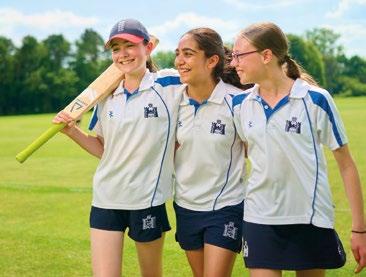
WINNER: REIGATE GRAMMAR SCHOOL, Surrey
The shortlist for this category consisted of Wycombe Abbey, Reigate Grammar School and Solihull School, with Reigate winning for the sheer scale of its charity involvement. Dr Emeka says: ‘I believe having 100 percent of the school’s students involved in charitable work and a number of different opportunities is incredible. Having students supported by a culture that values the service and impact of charitable work is vital for not only the immediate community, but the wider outreach.’ Lucy Cleland also wanted to recognise runner-up Solihull School for its ‘measurable, life-changing outcomes: cataract surgeries, clean water, new hospital units, prosthetic funds, and more. Long-term, transformational impact with exceptional sums raised.’

Mind & Mental Health Champion
WINNER: FRANCIS HOLLAND, SLOANE SQUARE, London
Berkhamsted School, Reigate Grammar School and Francis Holland, Sloane Square were our three nalists in this category. While all impressed the judges, Dr Emeka pronounced himself ‘thoroughly impressed’ with the support systems available for Francis Holland, Sloane Square students, such as its drop-in service, mindful journalling club and its therapy dog, Kanga (pictured). ‘For me, what also stood out was the connection between the students and the kind of society that the school promotes,’ he explains. ‘Recently, a 16-year-old student delivered life-saving rst aid to a man who collapsed at Sloane Square tube station. is shows not only a good health knowledge base by the school’s students, but also compassion and the awareness to deliver aid to somebody in need. e student went on to win the school’s Chaplain’s Award for Compassion, for which she was nominated by fellow students for showing remarkable kindness.’

Sustainability Champion
WINNER: HABERDASHERS’ MONMOUTH SCHOOL, Gwent
On the shortlist were Haberdashers’ Monmouth School, Cranleigh School and Berkhamsted School – all superb examples of what happens when you put sustainability at the heart of school philosophy. But Haberdashers’ Monmouth emerged winner overall for its wholeschool, student-led and outward-facing approach. Here, environmental responsibility is driven by students, often in partnership with local schools, charities and farmers. Projects are designed to have impact beyond school grounds, from mammal tracking across Monmouthshire to sixth formers delivering climate science workshops across the local community. Students are even working with chefs and suppliers to remove deforestation-linked ingredients such as palm oil from school menus. Lucy Cleland says she found Haberdashers’ Monmouth’s approach ‘impressive for going far beyond the school gates, with community and supply-chain impact’.




With thanks to Farms for City Children for help with judging the Animal Support Champion award, and to Christ’s Hospital School for its sponsorship of the Social Mobility Champion award




The prize winners will be receiving commemorative plaques. And for those who just missed out, it’s time to start planning next year’s entry – details in our Spring/Summer 2026 issue.
UK BOARDING SCHOOL OF THE YEAR 2025
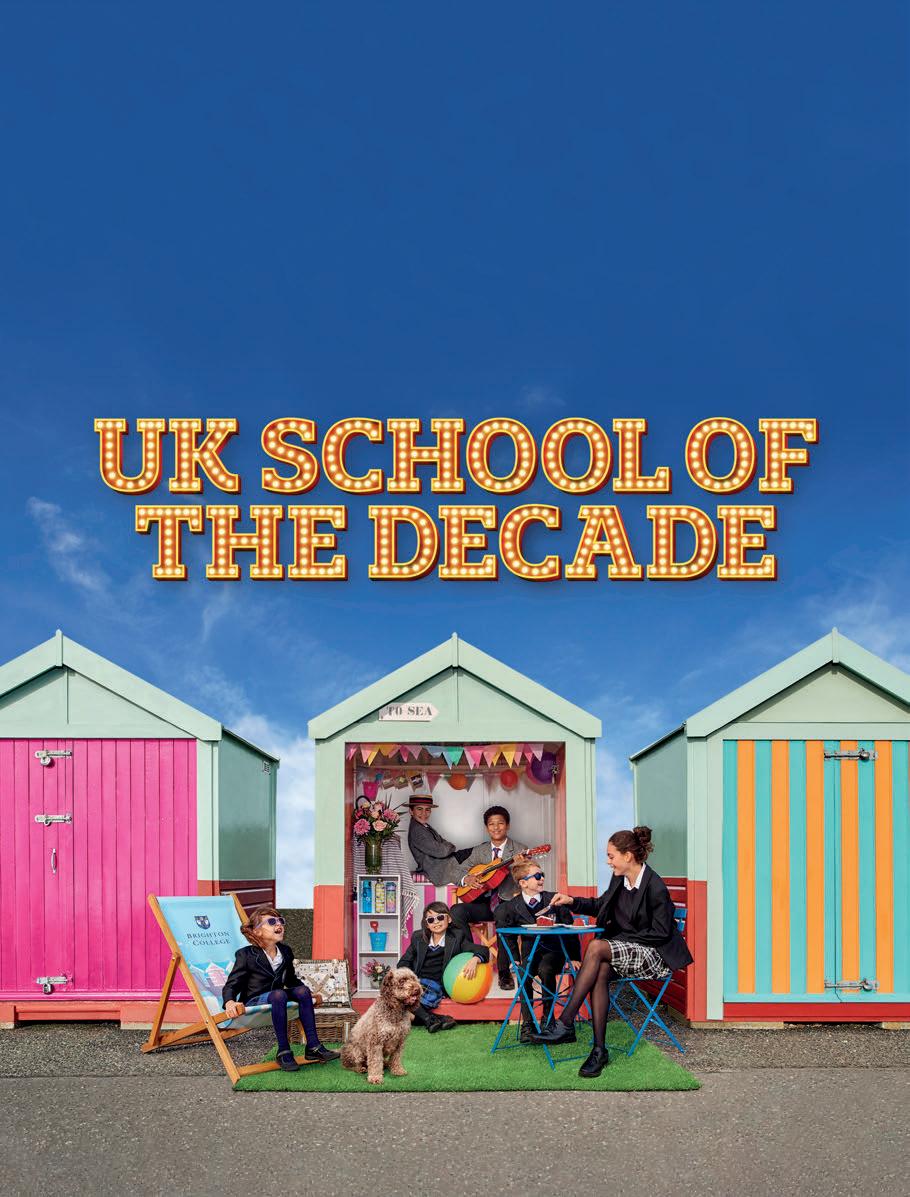
TOP
CO-EDUCATIONAL SCHOOL IN THE UK
THE SUNDAY TIMES
UK SCHOOL OF THE YEAR FOR A-LEVELS 2025
GIRLS AND BOYS AGED 3 TO 18 | JOIN US AT AN OPEN MORNING
CHARITY NEWS
The latest scholarship, bursary and fundraising updates

TRIATHLON TRIUMPH
Earlier this year, almost 800 children came together at Bryanston School for the Knight Frank Schools Triathlon. e event, now in its second year, raised over £58,000 for Restless Development, a charity empowering young people to create change in their communities. e day’s top team raised £1,500 and was made up of pupils from Port Regis School, who said: ‘Fundraising matters because it helps people who don’t have as much of a chance in life’.

A BRIGHT FUTURE
Former Eaton House e Manor pupil Rehaan S. has joined St Paul’s School for Boys after winning the prestigious John Colet Scholarship. Rehaan achieved high marks in multiple challenging exams to be o ered the academic 13+ award, which is named after the founder of the London senior boys’ school. With only about 30 St Paul’s scholarships awarded each year, Rehaan was ‘delighted’ to be chosen –and celebrated by spotting pu ns in Northumberland with his family.

OPPORTUNITIES FOR ALL
Christ’s Hospital has expanded its bursary provision to day students for the rst time. In September, the West Sussex school welcomed seven fee-assisted day students, who join almost two-thirds of Christ’s Hospital students receiving signi cant bursary support. For head Matthew Judd, this is ‘a moment of real signi cance in the school’s history’ that builds on its ‘proud tradition of accessibility’.

GIVING DAY GIVES BACK
is year, the annual Haberdashers’ Elstree Schools Giving Day raised almost £200,000 towards the schools’ bursary schemes, with a focus on helping current students at risk of having to leave the schools due to nancial pressures. Over 36 hours, 1,465 people took part in fundraising activities including colour runs and a fancy dress race.


LOOKING AHEAD
Bolton School has launched a new bursary schemethat aims to eventually provide one in every three children with a fully funded place. e Open Futures Bursary Campaign will use donations to help restore the growth of the school’s bursary programme, which has been impacted by the addition of VAT on independent school fees.
IN THE NAME OF ART
In April, then-upper-sixth

CLIMBING HIGH
Earlier this year, an 11-strong team of Ludgrove School sta and friends raised almost £25,000 towards transformational bursaries by completing the ree Peaks Challenge. Over 24 hours, the group climbed Britain’s three highest peaks – a total ascent of 10,052ft and a 37km walk.
COMING TOGETHER
At the end of the 2025 summer term, Cheam School donated over £30,000 to local Berkshire charity PACT (Parents and Children Together). Various events – including a Christmas fair, sports quiz and art exhibition – were held throughout the year by the Cheam community, with the money raised going towards PACT’s mission of supporting adoptive families, vulnerable women, and children who have experienced trauma.
BURSARY BOOST
Last academic year, Heathfield School, Ascot was awarded a £1.5m bursary grant by the Julia Rausing Trust. Named after the late philanthropist and Heathfield alumna, the school’s new Julia Rausing Bursary Fund will allow girls from low income households to attend Heathfield School on full, transformational bursaries.

HARD WORK PAYS OFF
An impressive 25 pupils at Farleigh School have won scholarships to top senior schools, including Wellington College, Cheltenham College and Dauntsey’s. From academic and sport to drama, choral and DT, the pupils attained awards across a wide range of disciplines. Non-scholarship leavers also secured places to schools such as Bryanston, Canford, Marlborough and Sherborne Girls.

student at Tudor Hall, Halyna Yin, was awarded the Trenchard Cox Art History Scholarship. Halyna stood out among 52 other entries with her writing: one essay on an artwork she loves ( A Map of Days by Grayson Perry) and one on an artwork she hates (Monk by the Sea by Caspar David Friedrich). The prize was a two-week Art History Abroad summer course in Italy.
MORE THAN A MOTTO
Schools need to demonstrate their values with action, says Matthew Bryan, head of Kingswood House School
Along time ago, the ancient Greek playwright Aristophanes wrote a comedy called e Clouds, one of the only contemporaneous portrayals of the philosopher Socrates. Spoiler alert: I’m afraid that Aristophanes didn’t paint a very attering picture. In the play, Socrates is accused of using philosophy as a device to make the weaker argument defeat the stronger – a way to cheat, to get ahead. I am sure Aristophanes would have had the same scathing thoughts about elite schools.
As C.S. Lewis put it many centuries later: ‘Education without values, as useful as it is, seems rather to make a man a more clever devil.’
It is an endlessly fascinating task to run a school in our modern soundbite generation. Not only is it challenging to reduce the complex and endlessly busy ecosystem of a school into a handful of words, but it’s noticeable how similar the messages are that come from so many schools. Taken at face value, prospects, stellar results and smiling faces abound – but I’m not so sure that schools are (as one prep school parent, who was looking at the choice of di erent senior schools in the area, memorably declared to me) ‘just di erent shades of white’.
Our vision at Kingswood House is to live our motto of ‘believe’. Believe in yourself and your potential. Believe in others and the goodness within them. Believe in the power and ability of your child or your student: given the right encouragement, the right teaching, the right tools and a broad interpretation of success, children regularly achieve astounding feats.

the watchwords at Kingswood House are opportunity, inclusivity and familiarity. Inclusivity means running a thoroughly neuro-inclusive and mainstream school. We celebrate and value diversity of all kinds, and challenge prejudice wherever it raises its head; that means anything from refusing to run an 11+ examination to ensuring that our learning support centre has a wealth of experts supporting the very wide range of needs that children can have. Some come with o cial diagnoses; others are more subtle. We don’t believe that there’s any child who doesn’t have needs, but equally, every child has strengths that can be nurtured and commended.
An area of diversity – and exclusivity by another name – comes in the form of school fees. Running a small childfocused, nurturing school that has all the resources that children need to ourish and thrive, which is able to impress joyful children and stern school inspectors alike, is not cheap. at is why it matters to have, and live by, your values.
‘Unlock children’s potential not with clever words, but with values. Simple words, said with meaning and an intention to live them out’
OK, we have a motto. So do many schools, and yet many children do not discover the amazing depths of their potential. So how to unlock it? Not with clever words, but with values. Simple words, said with meaning and an intention to live them out. For me,
is year, we chose to advertise ten 100 percent bursaries to children who might need and benefit from them – not as an afterthought or a bolt-on, but because inclusivity is integral to the way we do things. e response rate was heartwarming. We were also able to help some of our existing families for whom the shock of taxing education and adding VAT to school fees would have forced them to withdraw their children, had we not o ered assistance.
We believe that good SEND teaching bene ts everyone, neurodivergent or not. We believe that the Kingswood House School approach to bursary assistance bene ts everyone in our community. is is where principles and beliefs come to life, and form the foundation of our education with values. n
Matthew Bryan joined Kingswood House in Epsom in 2024


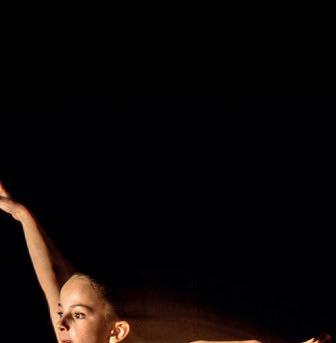











To take the first leap towards an extraordinary



LPS Mayfair Co-ed 11-16
106 Piccadilly, London, W1J 7NL
LPS Sixth Co-ed 16-18
79 Eccleston Square, London, SW1V 1PP
THERIVE R THAMES
LPS Clapham Co-ed 11-16
7-11 Nightingale Lane, London, SW4 9AH



Old Schools, NEW IDEAS
Innovative approaches to fundraising are creating more opportunities and bursary places for students, finds Victoria Lambert
Th is country’s centuries-old tradition of philanthropy has led to the potential provision of a world-class education for even the most disadvantaged child. From schools set up by enlightened individuals to those established by churches and even kings, there has always been a desire to see opportunities extended to as many young people as possible.
But in the current era, when there are so many pressures on individual finances as well as the burden of additional taxes, how do these schools keep finding ways to renew the foundations and endowments that allow them to offer the bursaries and scholarships that are needed?
The answers lie in remarkable work by the schools themselves as well as schemes that encourage the widest support from friends, family and the wider community. And for lots of beneficiaries of bursaries, the intention to give back to their school starts almost as soon as they leave.
At Christ’s Hospital School, Sussex, established in 1552 and the UK’s largest bursary charity with £25m of support provided each year, that prompt to give back is offered on the final day. The head recites The Charge to leavers, which reads: ‘I charge you never to forget the great benefits that you have received in this place, and in time to come, according to your means, to do all that you can to enable others to enjoy the same advantage. And remember that you carry with you, wherever you go, the good name of Christ’s Hospital.’
Hugo Middlemas, director of development at Christ’s Hospital, explains that for many alumni, The Charge acts as a catalyst for their giving back to
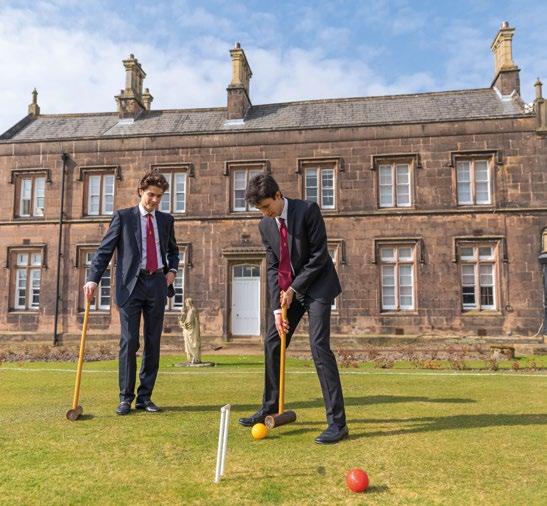
CLOCKWISE FROM LEFT: Croquet at Stonyhurst; students at Christ’s Hospital; head of St Peter’s, Jeremy Walker, speaking to donors
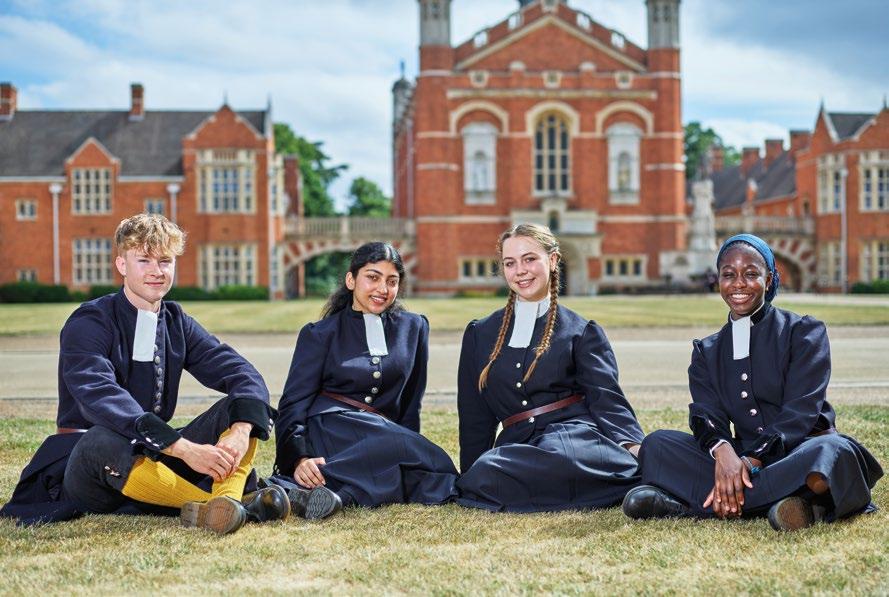
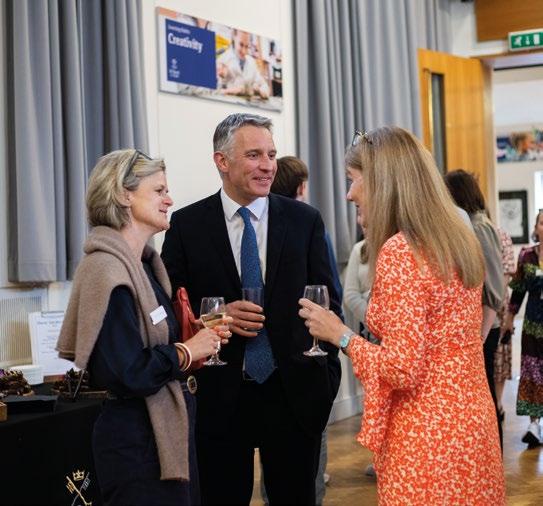
society and the school throughout their lives. ‘Christ’s Hospital alumni are highly focused on making the world a better place,’ says Middlemas. ‘Forty-three percent volunteer each month – double the UK average – while 10 percent go on to establish a charity.
‘Historically, parents have not been asked to donate to Christ’s Hospital’s work, since nearly 80 percent are in receipt of means-tested bursaries. This position changed in 2015 – parents now receive all fundraising communications and have been very supportive.’
But the pool that the school can draw from is wider than just family. ‘As the leading school delivering upward social mobility in the UK, Christ’s Hospital has a wide range of philanthropic partnerships with organisations and non-affiliated individuals,’ Middlemas says. ‘These include City livery companies, businesses, and foundations and other charities in the UK and internationally. Each partnership focuses on supporting individual students at Christ’s Hospital, with some having been in existence for hundreds of years.’
Former pupils are also a huge part of the fundraising community of St Peter’s School, York, says headmaster Jeremy Walker. Established in 627AD, the school has been in existence for almost 1,400 years and is the fourth oldest in the world.
‘We are fortunate to have a very supportive community who donate their time and money helping to diversify and improve the school for future generations,’ says Walker. ‘We also have a number of incredibly generous gifts left to us in wills from former

pupils, as well as large one-off donations to support causes close to the hearts of our Old Peterites.’
But a new century means new demands for funds, and new ideas on how to raise them. Christ’s Hospital is highly reliant on historic donations that have enabled a sizable endowment to be built, says Hugo Middlemas. ‘Unfortunately, the endowment today covers less than 50 percent of the school’s costs, and so needs to be grown significantly to maintain and develop Christ’s Hospital’s unique mission. The school’s ambition is to build its new fundraising income further, with a particular focus on endowment gifts.’
The Arnold Foundation – which offers busaries to talented children with a need for boarding at Rugby, a school founded in 1567 as a free grammar school for local boys – is also the subject of renewed focus, says head master Gareth Parker-Jones. ‘Thanks to the bequest of our founder, Lawrence Sheriff, we have more than 60 day students in means-tested places. We would like to make 40 places available to Arnold Foundation students in perpetuity for boarding.’
That same process is well underway at Stonyhurst College in Lancashire. While the school was established in 1593, its Stonyhurst Foundation was created only five years ago and has already raised more than £18m for bursaries. The school’s intention is to grow the Stonyhurst Endowment by £30m by 2030, reducing the cost of education for families and widening access.
International growth, led by Stonyhurst International School Penang, is also developing new income streams to reinvest in the college. And alumni matter here, too. ‘Through the Stonyhurst Association and the Stonyhurst Foundation,’ says headmaster John Browne, ‘alumni contribute as donors, mentors, ambassadors and advocates across the global Jesuit network.
‘Their generosity sustains bursaries, capital projects and pupil

ABOVE: Rugby’s head master, Gareth Parker-Jones, walking with students at the school
BELOW: Pupils at Christ’s Hospital School
opportunities, while their examples of lives lived with competence, conscience, compassion and commitment inspire the next generation.’
More targeted approaches can be powerful; in November 2023, a year-long scholarship appeal was launched in partnership with the Lord Mayor of London to mark the 350th anniversary of the Royal Mathematical School at Christ’s Hospital. With a focus on individuals and organisations in the City of London, the appeal set out to raise £250,000 to endow one scholarship in perpetuity. By the end of the year, some £800,000 had been committed, endowing three scholarships in perpetuity and establishing a wide range of new partnerships – including a maths outreach programme for students across the UK, and bespoke degree apprenticeships.
Rugby School, one of the very few schools where none of the money spent on bursaries comes from fee income, runs annual Giving Day fundraisers for its bursary programmes. These events have successfully raised awareness of the Arnold Foundation – not only from individuals, but syndicates. ‘I am particularly moved by the generosity of the earliest Arnold Foundation students,’ says Parker-Jones, ‘who not only contribute to the foundation themselves but who support our fundraising activities all over the world.’
In March 2022, St Peter’s School launched its Keys for Life campaign, which aims to give life-changing bursaries to pupils who would otherwise be unable to afford a St Peter’s education. The school increased its bursaries from 35 in 2022 to 47 in 2024, and has raised a total of £2m over these two years. ‘The campaign aims to continue to build as we approach our
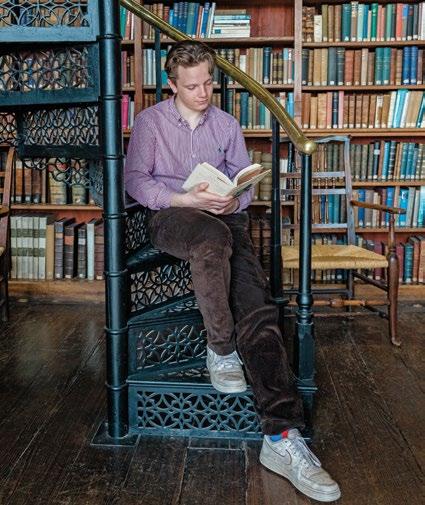

ABOVE: A Stonyhurst student in the school’s library
BELOW: St Peter’s pupils shared stories on behalf of bursary recipients at the school’s donor party

1,400-year anniversary, offering as many means-tested bursaries as we can,’ explains Jeremy Walker.
For any school looking to extend bursary provision, ensuring good governance and financial stability is particularly important. At St Peter’s, generating revenue through diversified streams ensures inclusivity and long-term security. Walker says that the school is ‘ahead of the curve in creating economic stability’ through prudent financial planning, diversifying income through lettings and international opportunities, and investment in its campus. ‘Our strategic plan sees us move to a two-school model by 2027,’ he explains, ‘which will make the most of our facilities and allow for significant investment in our larger year groups, such as building a new sixth-form centre.’
Stonyhurst, and its bursary provision, is inspired by its establishment as a Jesuit school. John Browne explains: ‘The purpose of a three to 18 Jesuit education is, in the words of St Ignatius, to “set the world on fire” – to prepare young people for lives of purpose, justice and leadership.
‘As the oldest continuously operating Jesuit school in the world, we recognise both the privilege and responsibility of that position. In a time of challenge and change, this means planning for long-term sustainability and deepening the culture of innovation that characterises all Jesuit schools globally.’
But no school can afford to rest on its laurels – and especially not now, says Gareth Parker-Jones. ‘Welcoming children from all sorts of backgrounds who are going to recognise – and seize – the opportunities at Rugby ensures that the school is a tolerant and respectful community in which to live and work, for all our students and staff. It makes teaching and learning a much richer intellectual and cultural experience.’
He adds: ‘This is particularly important at a time when parts of the Labour government appear determined to caricature independent schools as being preserves of a narrow elite, and when there is proof that its introduction of VAT on school fees is making independent education less attainable.
‘Rugby has a long and proud tradition of being accessible to talented children, regardless of their background. We are remaining true to our mission and charitable objectives by seeking to continue that tradition.’ n
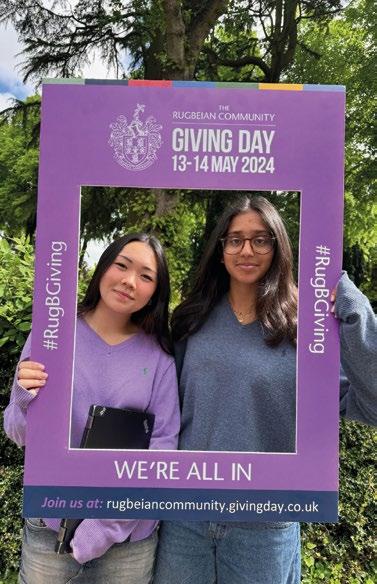
ABOVE: Stonyhurst pupils in the school library
BELOW: Rugby pupils at a Rugby Giving Day


Nope! I’m not coming home


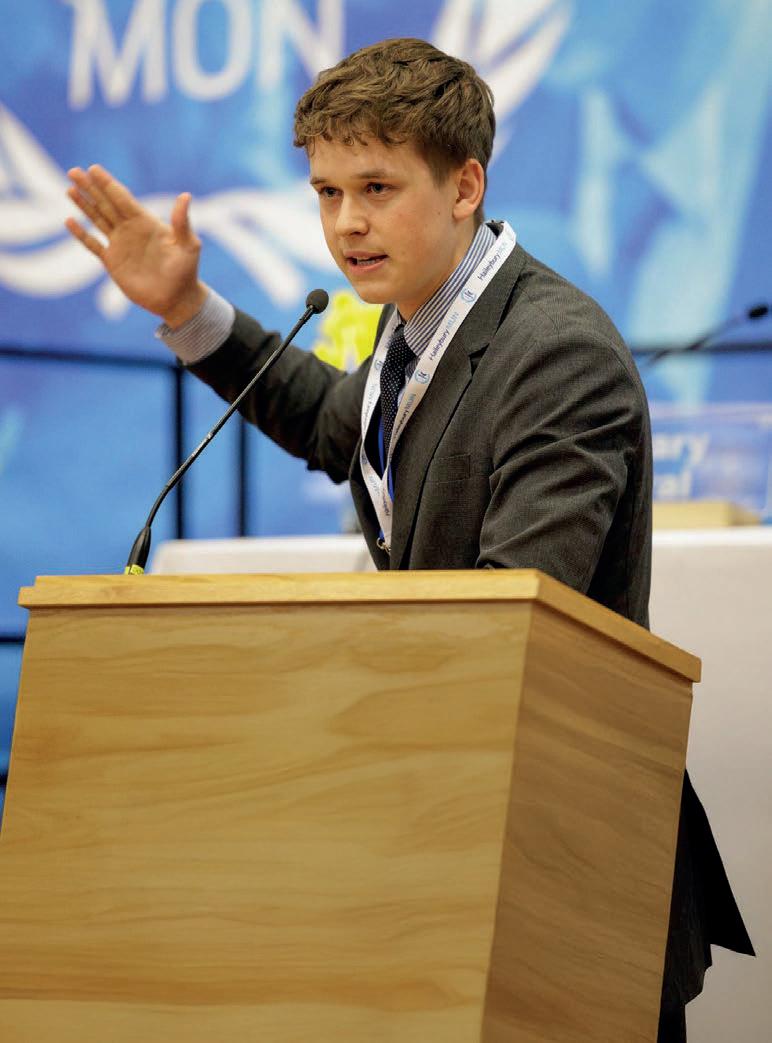
On the WORLD STAGE
The Model UN is becoming a vital tool in teaching global affairs, says Eleanor Doughty
It was the autumn term of 2009 at Haileybury School in Hertfordshire, and 13-year-old Oliver Hirsch eld was looking for an activity to do one evening. A boy in the year above, he remembers, had been attending the Model United Nations (MUN) club, and explained to him what it was all about. ‘I thought it was pretty cool,’ Hirsch eld recalls. ‘I hadn’t really done any public speaking before I came to Haileybury, and politics was something I was interested in, though I didn’t know much about it.’ So, he thought he’d give the club a go. ‘I went to an evening session and loved it – I thought it was amazing.’
Back then, Haileybury MUN had no more than 80 members. Today, there are in the region of 250, and it’s one of the school’s most popular co-curricular activities. Hirsch eld left Haileybury in 2014, and, alongside two of his peers, co-founded MUNiverse, a software company that helps support schools’ Model UN conferences. He returned to the school as a computer science teacher in 2018, and then in 2023, became its dedicated, full-time MUN coordinator – a role more or less unheard of elsewhere. But the movement is growing: earlier this year, Gordon’s School in Surrey was advertising for a part-time coordinator of MUN, debating, and mock trials. ‘MUN sta are some of the best sta I meet in schools,’ admits Hirsch eld.
e MUN initiative began in 1921, initially as a series of League of Nations simulations – the rst of which took place at the University of Oxford that November. After the United Nations was founded in 1945, the simulated version adapted with it, and now, more than 400,000
students of all ages take part in MUN conferences worldwide every year.
At Sydenham High School in south London, one of the 26 schools in the GDST network, geography teacher Jennie Dracup has recently taken over an embryonic MUN club. In September, the school introduced its new academic enrichment curriculum, and the research and preparation work that the girls do for MUN will form a part of this. ‘In a world where women’s rights and voices seem to be being eroded, the ability to formulate persuasive arguments is a crucial skill for our girls,’ says Dracup. She can see the progress her students have made in ‘developing strong oracy skills and con dence in articulating and sharing ideas.’ Plus, their worlds are opening up: ‘ ey are developing greater depth in their understanding of key global issues; MUN gives the girls the opportunity to engage in collaborative debate and learn important skills of diplomacy.’
Model UN is also thriving at Stowe School in Buckinghamshire, under the watchful eye of history teacher Rhea Sta ord-Smith. ‘It’s one of those things that you just have to see in action to think, “this is brilliant”,’ she enthuses. Stowe runs two MUN clubs: one for years nine to 11 and a senior club for older pupils, and both are open to all – though Sta ord-Smith has a reasonable expectation that ‘if you sign up, you come for the term’. It is, she observes, a cunning way of nding new talents within the pupil body, especially from those who might not have identi ed themselves as natural-born debaters, but rather ‘those who nd that they enjoy it and are quite good at it’.
Of course, MUN is not just about standing up and ponti cating.

At Christ’s Hospital, Model UN is a popular club for sixth formers

Mirroring the real United Nations, MUN activities are split into di erent elements, from the Security Council – with its responsibility for the maintenance of international peace – to the General Assembly, where decisions are taken on security questions. As such, the club attracts a wide range of pupil types.
Catriona James, English teacher and director of MUN at Felsted School in Essex, can divide her MUN charges into several categories. Among them: ‘the shy and quiet, the quiet but not shy, and the people who don’t see themselves as clever enough.’ She encourages the rst group, saying, ‘if you’re interested in what’s going on in this world, MUN is a ring-fenced opportunity to do some research into a topic on which you can have opinions.’ Such pupils, she adds, can involve themselves in the note-passing – a mechanism for correspondence across the room – or can support a committee during the lobbying process.
Others learn by osmosis. One of James’ former pupils, now a doctor, found it hard to commit to much on top of her studies, and instead was encouraged to observe in MUN sessions. Such pupils are welcomed with open arms by James ‘to pick up on what’s being discussed and form their own silent opinions – it’s still a learning process’. In fact, MUN rewards ‘the quietly studious’, as Sta ord-Smith puts it. ‘It’s a really good medium for pupils who like to have done their research. In more traditional forms of debating, you can get away with not knowing your stu but sounding con dent.’ In MUN, ‘there’s more opportunity for you to be challenged, and opportunities, if you’re well-prepared and up against somebody who isn’t, to say, “actually, I think you’ll nd...”. It does a brilliant job of building those skills.’
Professor Neil Mercer is a psychologist focused on the development of children’s spoken languages, and the author of Oracy: e Transformative Power of Finding Your Voice. Initiatives such as MUN, he says, help young people see that they can make their voices heard ‘and that they don’t need to let others be the people that speak out. If it’s done well, it means that they become better at listening to other people’s points of view and evaluating them’. But they have to be taught to do it. ‘Like anything else with spoken language, we’re not hard-wired to do it,’ says
Professor Mercer. ‘If you just put people into groups and say “discuss this”, you’ll often nd that one person dominates. It’s only when people are trained how to operate in that sort of situation that they can do it well.’
Is Model UN more important now than ever before, in this turbulent world – or is it just that today’s generation of schoolchildren know more about the global context than previous generations ever did? For Hirsch eld, there are obvious ways in which the MUN context has changed. ‘When I was at school, we could have a newspaper delivered to our boarding house, and that would be the main information source,’ he recalls. ‘You could go online, but news apps weren’t great, and newspapers were still the best ways to get proper news.’ Now, teenagers can access anything at the touch of a button – and that can be a good or a bad thing, he says.
‘Yes, they have access to more information, so they should be able to nd lots of opinions. But some pupils are more politically driven now, and more likely to fall on either the left or the right. at in uences how they do at MUN and what countries they think they should be representing – and which ones they see as “good” and “bad”.’ For his own part, he laughs, he always liked ‘stirring the pot in debates’, and has a penchant for representing the Democratic People’s Republic of Korea.
Sta ord-Smith also observes how the teens of today are ‘very well informed but from a particular perspective. You’ll ask, “have you heard about XYZ?”, and quite a lot of the time they have, but it’s fascinating to see the di erent information they have been given, depending on which corner of the internet they live in’.
Playing the part of more ‘problematic’ countries is all part of the intellectual challenge, says Rory Drummond-Fawcett, who teaches English at Christ’s Hospital in West Sussex and manages the school’s MUN club. ‘Students like making a speech that gets a few laughs or gasps, and some like to be provocative and say things that – hopefully – they don’t mean.’ At Christ’s Hospital, Drummond-Fawcett explains, ‘there are a lot of sporting and musical accolades to be awarded, and MUN is one of those places where academic prowess gets a bit of a spotlight’. He takes a backseat and allows the sixth formers to lead the
Haileybury’s MUN conference celebrated its 30th anniversary in 2025

sessions ‘so it feels like they’ve got some responsibility – they like showing o ’.
As for whether MUN is a good thing to for students to put on their CV or university personal statement, ‘in and of itself, “I do Model UN” probably doesn’t carry much weight’, Drummond-Fawcett says. ‘But it helps with the skills that are going to impress in an interview environment. We have seen a lot of quiet, shy students come out of their shell in MUN.’
Hirsch eld re ects on his own similar experience taking part in MUN. ‘I learnt so much about how to speak publicly –in lessons you might read from a chapter in the classroom, but that’s nothing compared to having to write your own speech and deliver it in front of people on a frequent basis. e idea that you’re forced to understand other people’s point of view, not just because you have to speak about it but because it’s also part of the diplomacy part, is one of the soft skills that you won’t nd in a lesson environment.’
ere is a critical social aspect to MUN, too. When James takes her pupils to the International School of the Hague’s annual Model United Nations conference, they drink it all in: ‘that understanding of connection – of colour, creed and kind – in a world that seems to be increasingly polarised’. She continues: ‘ e UN wasn’t made to send us to heaven; it was designed to prevent us from going to hell, and that resonates. If we can talk to children about nding a common ground, whether that’s on an international level or a social level, they will be absolutely ne in life.’ n

TOP: Rhea Stafford-Smith, history teacher at Stowe, also leads the school’s MUN clubs
BOTTOM: MUN at Christ’s Hospital is managed by Rory Drummond-Fawcett, English teacher

BUILDING A FAMILY LEGACY
Experience exclusive family adventures with Steppes Travel
Afamily holiday isn’t simply about getting away together. It’s about stepping into experiences that shape stories, bridge generations and build a legacy that lingers long after the return home.
We don’t design family holidays as distractions or crowd-pleasers. We create journeys that honour curiosity at every age, from wide-eyed wonder to seasoned perspective, giving space for children, parents and grandparents to feel part of the same adventure.
Time together is precious; at Steppes Travel, we help you use it well. That might mean tracing turtle tracks across a moonlit beach, hearing migration stories from Maasai elders, or learning how to forage in the Amazon. We believe in journeys that give everyone a role, making each family member feel not just included, but essential to the experience.
This isn’t about ticking off landmarks. It’s about creating shared moments: tracing the tracks of pharaohs, kayaking with your teens in Croatia, laughing together on a river raft or sitting in stillness while the night sky unfolds above. Moments that deepen bonds create memories to be recounted time and again.
Our long-standing relationships with guides and hosts mean that family trips


aren’t just holidays – they’re opportunities to connect with people who make places come alive. From conservationists to storytellers, scientists to artists, we match you with those who inspire across generations.
Travelling as a family can sometimes feel complicated, but with over 30 years of experience, we know how to create journeys that balance pace, comfort and wonder.
Whether it’s a villa on a private island, a safari camp in the wild or a homestay in the mountains, we ensure every detail allows you to focus on what matters most: each other.
Steppes provides conscious luxury: not opulence, but enrichment. Travel that feels good not just for you, but for the communities and landscapes you encounter. Better experiences create better memories and in turn, better outcomes for the world your children will inherit.
When you return home, you’ll carry more than photographs. You’ll return with a deeper sense of connection, to place, to people and, most of all, to each other. So travel – not just together, but deeper. Strengthen the ties that bind.
Your wealth is the work of a lifetime



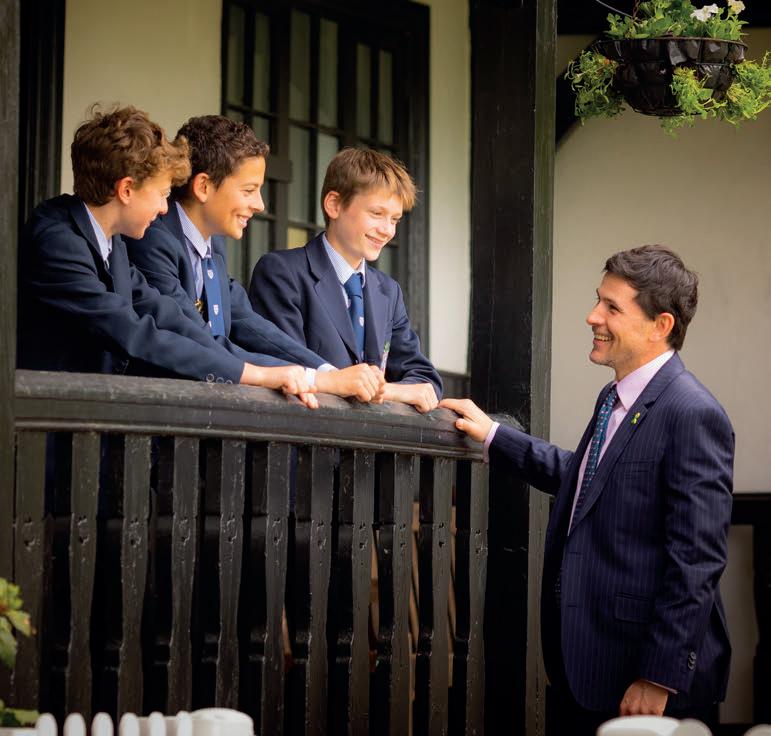
On a MISSION
Reed’s School is a unique haven with a dynamic sense of purpose, says Alice Smellie
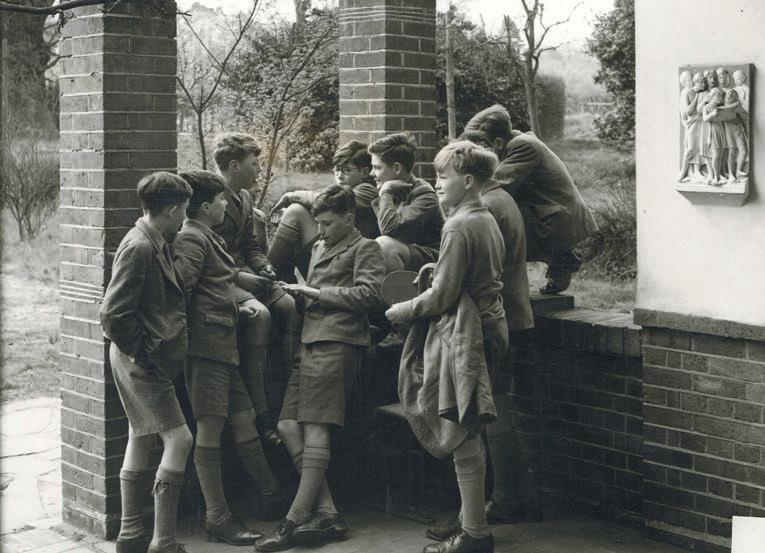
Perhaps it’s unsurprising that the pupils of Reed’s School in leafy Surrey are known for being especially thoughtful. Nestled in the tranquil Surrey countryside, Reed’s may look like a quintessential English boarding school, with its immaculate grounds and historic buildings. But behind the elegant façade lies a heartwarming story – one rooted in resilience, compassion, and a philanthropic spirit that stretches back more than 200 years, in the form of the Andrew Reed Foundation. ey say that charity begins at home, but for some young people, school also represents a haven of support and healing. While all independent schools have charitable initiatives, Reed’s and its a liated Andrew Reed Foundation are quite unique, with a focus on supporting children who have been through trauma.
Since the early 19th century, the Andrew Reed Foundation (also known as the Reed’s Foundation) has been driven by a simple yet profound mission: to uplift children facing extraordinary challenges through education, emotional care and community engagement. More than 13,000 children have had their lives transformed through this commitment. e story begins with a man whose life sounds like something from the pages of a Dickens novel. ‘Andrew Reed was not just a man of faith, but a human rights activist before human rights was really termed,’ explains the school’s headmaster, Mark Hoskins. ‘He started o as a nonconformist minister

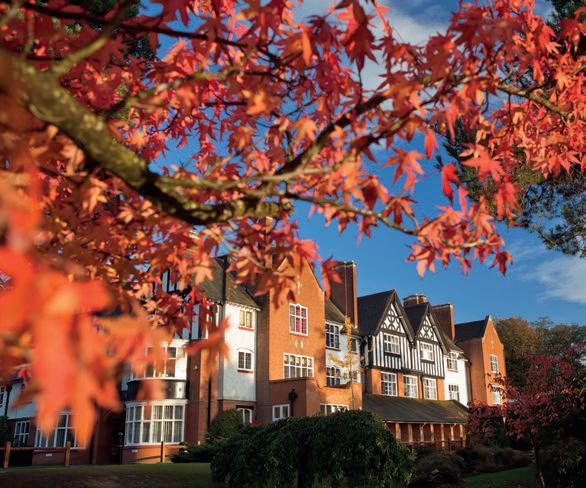


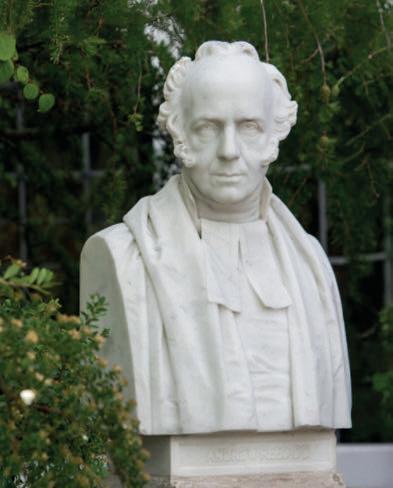
in a church in east London. One of his parishioners, a 27-year-old man, was dying – a tragedy that was going to leave his two young daughters as orphans. e young man asked Reed to look after them. In spite of being unmarried and living with his sister, he took them in while trying to nd a longer-term solution.’
At this time, of course, there was no welfare state, and Reed was appalled by the general lack of provision for children in such situations. He believed that if they could be educated, then that gave them the best chance of a productive and successful life.
‘In 1813, he brought together a group of like-minded individuals – he wasn’t wealthy himself, but he was apparently absolutely fantastic at uniting wealthy and in uential people,’ continues Hoskins. ‘And that’s how the foundation, and the school, started. Initially based in Clapton, the school moved to Watford in 1871, and nally to Cobham, Surrey in 1946 after the Second World War.’
Andrew Reed’s ambitions extended beyond this one institution: he devoted his life to good causes, subsequently founding other charities and campaigning for the abolition of slavery in the US.
‘He was quite a remarkable person,’ says Hoskins (with admirable understatement).
Fast-forward two centuries, and the need recognised by Reed hasn’t diminished. Just because times have moved on, it doesn’t mean that provision for young people who have experienced trauma is
CLOCKWISE: Reed’s boarders playing football; a statue of Andrew Reed on the school grounds; Reed’s school buildings; pupils at Reed’s in the late 1950s or early 1960s

adequate – far from it. It’s estimated that over 46,000 children lose a parent every year; Child Bereavement UK points out that one in 29 young people aged ve to 16 has lost a parent or sibling, which equates to one child in every school class. And bereavement has no respect for background.
After 1958, Reed’s expanded to take fee-paying boarders, and now, around 10 percent of pupils attend the school via the Reed’s Foundation, with a focus on vulnerability. e majority of these pupils are on a full bursary.
Of course, pastoral care is a cornerstone of the school for all pupils.
e headmaster’s welcome reads: ‘At the heart of our school is the understanding that exceptional pastoral care is fundamental to shaping pupils’ character and happiness, and this we do within an educational environment where we nurture and encourage, where we stretch without stressing and push without pressurising.’
Hoskins explains: ‘ is focus is very deeply entrenched, but the foundation speci cally is all about looking after vulnerable children who have su ered family trauma that has led to one or both parents not being present.
‘ is is extrapolated in reality; the school has supported, and continues to support, children who are orphans, have been in care, have lost one parent through death, live in a household with a parent su ering from long-term mental or physical illness – often terminal – or in households a ected by domestic abuse. Reed’s has also been able to support children whose parents have su ered trauma, such as the loss of a child, which has unsurprisingly caused breakdown within the family.’
If this sounds undoubtedly serious, bear in mind that the school itself is a place of joy. e imposing yet welcoming buildings are set in 40 acres of leafy countryside, and there are around 850 pupils: all
boys from 11 to 16, and a co-educational sixth form.
Finances, you might be surprised to learn, are only a part of the support. ‘Some pupils might need a bit of extra support from the Foundation O ce, around anniversaries, for example,’ says Luke Michael, deputy head of pastoral. Grief counselling is also o ered. ‘We don’t charge for this. It doesn’t matter if your parents are well o . If you lose a parent, the grief is still very much there.’ Trauma counselling for children is incredibly specialised and nuanced, he adds. ‘Some want to speak about their experience and feelings, but for some it takes years, and then others choose to speak in order to help other children.’
e school spoke with charity Grief Encounter a few years ago and realised that many children wouldn’t have had adequate counselling. ‘We are very proud of what we do,’ Michael says. ‘Grief is very individual, and it’s not discussed enough – it’s not on the National Curriculum.’
If you’re thinking that this sounds a little like Frances Hodgson Burnett’s A Little Princess, where the impoverished heroine stands out from the others (it’s hard to avoid thinking about Victorian imagery), then be reassured. ‘We don’t identify Foundation children, as we want them to seamlessly t into the school,’ Michael explains. Besides, these pupils aren’t pitied, but empowered.
e school has incredible outreach opportunities, with the altruism of the foundation having a ripple e ect. ‘We do a lot of work with schools within Tower Hamlets,’ says Kathryn Bartram, director of external relations. ‘ e inner-city schools are lovely, but they often don’t have large open spaces – one school has come to Reed’s to hold their sports day every year for the past 17 years or so.’
ese schools can also suggest pupils who might be in need of Reed’s. ‘We work very closely with the heads and the senior teachers, and they also identify Foundation pupils for us. Every year, perhaps three or four
Reed’s has around 850 pupils, with all boys from ages 11-16


come to us via the outreach programmes.’
e foundation’s expertise even extends globally: ‘We recently spoke with a school in Canada. e head teacher had heard about the Andrew Reed Foundation, and we did a Zoom call because they wanted to take on more vulnerable children.’
As well as wishing for an excellent education for their children, many parents choose Reed’s because they want their children to learn to judge people by who they are, and not by where they go on holiday or what car their parents drive. ‘ ey wish for them to have a sense of compassion and to look at people as individuals,’ Bartram says. Parents are drawn to the school because of its altruistic reputation and fantastic pastoral care for all, as well as its excellent academic reputation.
It goes without saying that the cost of funding such an endeavour is enormous, and the majority comes from external fundraising. Up until the death of Queen Elizabeth II, every single reigning monarch since 1815 had served as a royal patron of the Reed’s Annual Foundation Appeal – the longest running annual appeal in the country. It even ran throughout the Second World War, with Bartram pointing out that even the Lord Mayor’s Appeal had to be halted during this time.
Alumni are often supportive too, wishing to give back. ‘We have an indoor cricket centre that was funded by a former Reed’s Foundation pupil who went into the City and became quite wealthy. He donated to the foundation and so we set up the centre, the income from which goes back to helping others,’ says Bartram.
In the words of former pupil, ‘Reeds as a whole isn’t just a school – it’s a home where potential is seen, nurtured and created. It takes in children and sends out young adults who not only believe in themselves but know they are believed in. e Reed’s Foundation equips its students with the tools to build their futures, but it also surrounds them with a network of care, compassion and encouragement.’
But the bene ts to pupils – both bene ciaries of the foundation and those fortunate enough to be attending the school – are perhaps immeasurable. n
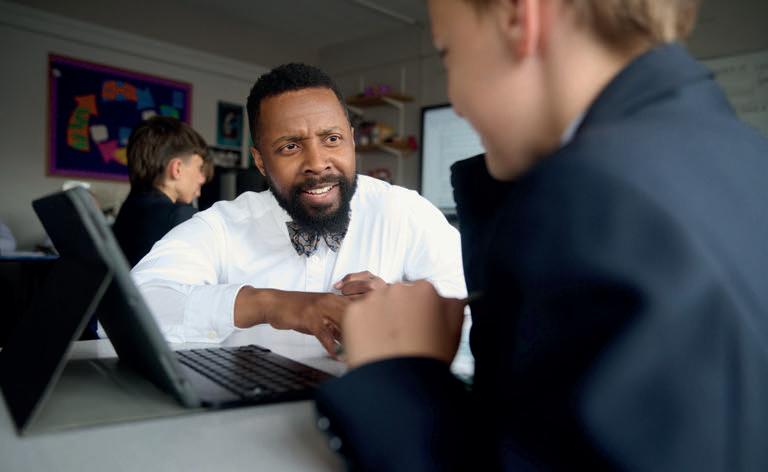
INSIDERS’ GUIDE
How do I achieve a bursary for my child? Don’t panic – the system is designed to help, not hinder, says Eleanor Doughty
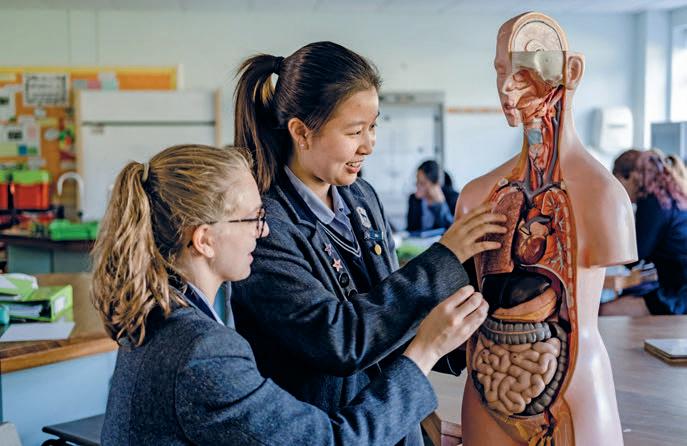
THE PANEL:
Will le Fleming
Master, omas’s College
Becky Whitham
Director of nance and operations, Royal Grammar School (RGS) Guildford
Helena Briggs
Bursar, Reigate Grammar School
Alison Wienekus
Director of marketing and admissions, Roedean School
When should parents looking for bursaries think about applying?
Parents tend to start thinking about it when their child is in year four going into year ve. At that point, you’re aware of your own circumstances – and that’s the time to
look at what schools are saying about the programmes they provide. Parents should be giving some good thought to applying to bursaries by the time they register their children for school places in the autumn term of year six. Will le Fleming
What happens if my circumstances change, for better or worse? If you are in receipt of a bursary, your circumstances will be reviewed annually. Based on this assessment, the bursary award for the next academic year may be adjusted upward or downward according to your current nancial situation. If your nancial circumstances change during the academic year, we encourage parents to contact us for an early assessment. We are always happy at RGS Guildford to speak to parents and give
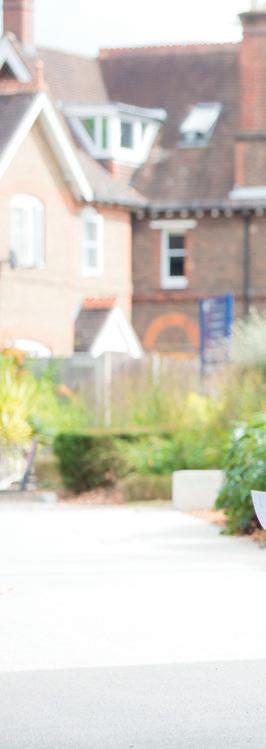
advice about anything they might be worried or unsure about. Becky Whitham
Do I still have the same rights as other parents, for example to make complaints and/or suggestions?
Yes, absolutely. Bursaries are intended to enable gifted children to attend the school irrespective of family income. Applying for a bursary does not and should not disadvantage a family or a child’s application to the school. Helena Briggs
Does it matter if my child is not gifted in some way? Absolutely not. At Roedean, we value each girl as an individual and believe that every student brings her own unique strengths, interests, and potential. Our
Bursaries allow students at Roedean to experience a full, life-changing education

admissions process is designed to identify a girl’s ability to thrive in and contribute to our vibrant school community, rather than focusing solely on exceptional gifts in a particular area. Alison Wienekus
Do I apply to more than one school?
At omas's College, we encourage a sensible and moderate approach to applications, in line with university applications where you make four or ve choices. I would say that’s a reasonable number of schools. Making applications with a good range between them is the best way to make sure you get the right outcome for the right child. Panic and the fear of missing out leads to terrible pressure – children are put through ten to 12 di erent processes and it’s far too much. Will le Fleming
Is it better to go local when looking for a school with a bursary? Would that be preferred by the school?
Not necessarily – we would not look in any way unfavourably on a family who needed to travel to get to us every day. We always advise nding a school that feels like the right t, and that may not always be the most geographically obvious choice. Many Reigate Grammar families receive bursary funding but are not necessarily considered local. Helena Briggs
Are boarding fees covered, or can I ask for boarding fees to be covered?
Our bursaries are means-tested and are intended to support families who would otherwise not be able to a ord a Roedean education. ey can include assistance with
boarding fees where appropriate, depending on individual circumstances. Our bursary committee considers each application carefully and holistically, with the aim of supporting girls for whom boarding at Roedean would have the greatest impact. Alison Wienekus
Is there extra pastoral support available for pupils on bursaries?
We proudly maintain the con dentiality of those students in receipt of an RGS bursary and, as such, there is no speci c provision –however, our pastoral support is one of the great strengths of the school. Each student is provided with bespoke, individual support as and when required to ensure that they are happy, ourish and ful l their potential. Becky Whitham
At Reigate Grammar School, bursaries enable gifted children to attend irrespective of family income
TOP TIPS FROM THE BURSAR’S OFFICE
Please do not hesitate to ask us anything. Our finance team are kind, patient and generous with their time and will talk you patiently through the process and help as required. Becky Whitham

Will my child stand out as a bursary pupil? No, absolutely not. Our approach – and this is echoed by many schools – is that there is no distinguishing factor between students on a bursary and anyone else. A great school should be giving a bursary place that includes access to the wider range of opportunities, from music lessons to trips. Every child’s experience at the school should be exactly the same as everyone else’s, and every opportunity should be available to every child. Will le Fleming
Who pays for school trips? For families receiving a 100 percent bursary, the school will fully cover the cost of compulsory school trips. Families receiving a partial bursary may be expected to contribute to the cost or cover it in full, depending on the level of support awarded. Non-compulsory trips are generally not covered, unless they are closely linked to the curriculum and likely to bene t the student’s academic progress. Becky Whitham
Is there an income limit for those seeking a bursary? e exact amount of fee reduction will depend upon family circumstances, however, families with a total gross annual income over £130,000 are unlikely to qualify for a bursary. We attempt to help as many families as possible and have a exible and agile approach to supporting social mobility. Parents are encouraged to contact the bursar to discuss their individual circumstances, in complete con dence. Helena Briggs
Am I more likely to get a day bursary or a boarding one? is depends entirely on your family’s circumstances and on the outcome of the means-testing process. e key is to ensure your application re ects your family’s genuine need and the reasons why a Roedean education, day or boarding, would be transformational for your daughter.
Alison Wienekus
Let the school know at the very start of the admissions journey that you need to apply for a bursary. You should be able to do this when you submit an application. Sometimes parents worry it will disadvantage their child, but this is simply not the case, and earlier knowledge makes it easier to help with affordability. Helena Briggs
Firstly, I would love parents to be aware of bursary programmes, because the honest truth is that many of the families we would love to support haven’t come across the word ‘bursary’ before. Then, once you’re aware of it and you’re looking at financial support, be totally open. The school will ask for lots of information, but in turn you should ask anything you like – there’s no such thing as a silly question. For families looking at this area for the first time, it’s really important to make sure they feel empowered to be in control of the process. Will le Fleming
Don’t rule yourself out before you’ve even begun the conversation. Every family’s circumstances are unique, and we encourage parents and carers to reach out to us early to discuss the bursary process openly. Many families are surprised to discover that support may be available even if they hadn’t thought they would qualify. Alison Wienekus n
Royal Grammar School Guildford has a supportive finance team on hand to help with any bursary enquiries



Enabling children from undeserved communities to experience the adventure of working together on our farms in the heart of the British countryside

farmsforcitychildren.org admin@farmsforcitychildren.org @farmsforcitychildren

Class Acts
From future doctors and musicians to young actors and athletes, Evie Calver reports on the bursary students making their mark

ZACHARY R.
Taunton School, Somerset
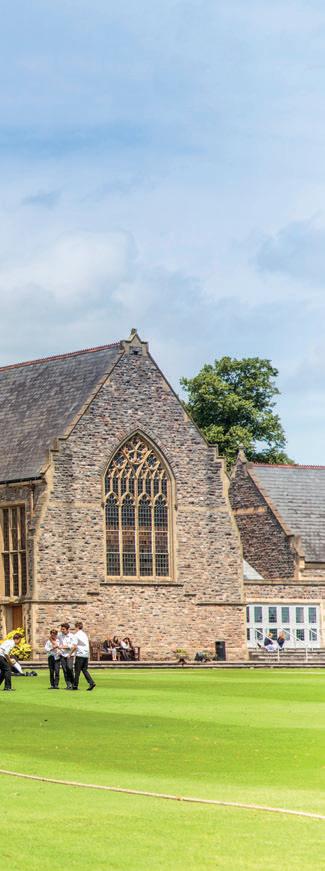
‘I believe fulfilling my dream of becoming an actor is possible thanks to my time as a scholar at Taunton’
I was over the moon when I received my drama scholarship. It has opened up so many opportunities for me, in school and out, and allowed me to focus on my love for drama.
I recently gained a place with the National Youth eatre, an achievement I am incredibly proud of. I have also taken part in theatre productions across the UK, and over the summer, I won the National Youth Monologue Competition. I de nitely believe my scholarship has helped me get to where I am today, and everything I have learnt from my exceptional teachers has helped me to really grow as an actor.
I also gained some fantastic GCSE results this year and have bene tted greatly from the perseverance introduced by my sports teachers and the core value of resilience that is at the centre of school life. Taunton School has helped me succeed in all areas, not just drama. I’m looking forward to continuing to be involved in as many school productions as I can throughout my sixth form years, while studying A levels in English, philosophy and drama.
Beyond that, I believe ful lling my dream of becoming an actor in theatre and lm is possible thanks to my time as a scholar. If you’re thinking of applying for a scholarship at Taunton School, I would encourage you to take the opportunity by the scru of the neck – you won’t regret it.

PHILOMENA A-E.
Farleigh School, Hampshire
‘In all honesty, joining the school was the best decision I could have made’
Before joining Farleigh on a full bursary, I was at a Catholic school in north London. It was intimidating for me to move to an unfamiliar setting to the one I grew up in, but I decided to put my best foot forward and work hard.
I will admit that for the rst few months I was quiet and shy. Slowly but surely, I started making friends and becoming more and more open-minded to what Farleigh had to o er, like the athletics team, netball club, cooking club and LAMDA programme. In all honesty, joining the school was the best decision I could have made.
Farleigh has helped me in more ways than I could imagine. Netball, for example; I had never played before but the huge support from my teachers and peers brought out the potential in me and I moved up from the sevenths to the fourths. I was then selected for the U12A team to compete at the IAPS U12 Netball National Finals at Mill eld – an achievement I could only have dreamt about.
Boarding life was exactly what I expected and more. It feels like a second home. When I arrived, everyone showed great hospitality towards me and made me feel comfortable. Academics are also very important at Farleigh; they present numerous and di erent opportunities to learn and expand your knowledge, through learning support, prep time and optional extra study sessions. My teachers have always encouraged me to be the best version of myself, physically and mentally.
Farleigh has been a wonderful experience so far and I cannot wait for the year ahead.
OGECHI A-O.
Lancing College, West Sussex
‘My background is quite different to many of my peers’, but I have never felt out of place’
I graduated from Lancing College this summer after two years as a Lancing Foundationer (the college’s bursary programme). Being given the opportunity to study at a school like Lancing has truly changed my life. e high standard of education I’ve received has prepared me well for my next steps – I have won a place to study medicine at my chosen university and I hope to become a psychiatrist.
Transitioning from my previous school was made so much easier by the college’s warm, inclusive atmosphere. From day one, both sta and students made me feel like a valued part of the Lancing community. Although my background is quite di erent to many of my peers’, I have never felt out of place.
Lancing is more than just a school; it’s a place where I’ve been challenged, supported and encouraged to grow, both as a student and a person. I’ve taken part in incredible experiences, from sailing and private tennis lessons to academic trips, career talks and advice from leading professionals.
e friendships I’ve formed and the experiences I’ve had will stay with me for life.
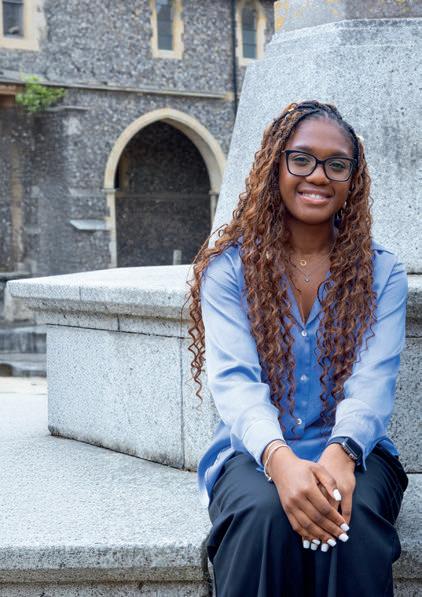

AVA D. Knightsbridge School, London
‘I would not have experienced these life-changing opportunities without the school’s fantastic bursary programme’
I arrived at Knightsbridge School (KS) on an academic scholarship in year seven from a local state school, and it was the best decision I have ever made. Despite my initial worries, I was instantly met with KS’ welcoming and kind energy.
From the start, I have been given opportunities I wouldn’t have received elsewhere, and KS has nurtured my independence and con dence, enabling me to become head girl. I have taken part in numerous academic and sporting opportunities, including placing second in the ISA Essay Competition out of hundreds of entries nationwide. Outside of school, I am an international karate champion, competing several times a year. KS has encouraged my extra-curricular passions, helping them thrive alongside my academic life. Without the fantastic bursary programme, myself and many others would not have experienced these lifechanging opportunities.
I am now applying to sixth forms, and KS has played a signi cant role in nurturing my passion for literature as well as motivating me to consider careers in law or journalism. Having just begun my last year at Knightsbridge, I am con dent my connection with the school will continue beyond my GCSEs, and I will carry the KS Code with me through life.

TANYA D. Highgate School, London
‘I was able to fully explore my potential –academically, socially and emotionally’
I was a bursary holder at Highgate from year seven to 13 and absolutely loved it. Before I joined, it was quite scary; it wasn’t something I’d thought of doing before. My friends were worried it wouldn’t be the place for someone from my socioeconomic background, but that wasn’t the case at all. It’s a really caring, inclusive place and as soon as I arrived, all my preconceptions were dissolved.
Interacting with people from di erent backgrounds was a really enriching experience, because we can learn and grow from each other. I’m happy to say that I made friends for life at Highgate.
I felt a bit out of my depth at rst because lots of other people had already done French at primary school, whereas I hadn’t. But I really enjoyed it once I got to grips with it, and I’m now in my second year at the University of Oxford studying French and Spanish.
During my nal year at Highgate, I was elected as pupil head of school, which was so good for my con dence. You can make as much of the role as you want, and personally, I was particularly interested in inclusion and community – making the school feel like a second home to all and accommodating everyone.
My brother also went to Highgate as a bursary holder and my mum could talk for England about all that Highgate has done for us! It gives you the experience to fully explore your potential – not just academically, but socially and emotionally.

HENRY R.
Charterhouse Square School, London
‘Knowing people believed in me made a big difference’
I’ve always loved music – I play the cello and enjoy classical pieces, even if I don’t listen to them that much. I recently received a music scholarship to Forest School, and I felt so proud and grateful when I found out, especially as it was the only school that o ered me a scholarship. I’d been practising every day and working hard so it felt like everything had paid o .
After passing Forest’s entrance exam, I applied for the music scholarship. I was invited for a short audition where I played two prepared pieces, did scales and arpeggios and sightread some music. It was quite intense.
Charterhouse Square School helped me get ready for the interviews and gave me lots of academic preparation, which was really important for that rst step. But it wasn’t just about academics – the school also helped build my con dence. I had interview practice, got lots of encouragement, and Charterhouse Square always made me feel like I could do it. I felt supported from the start by my teachers, my friends, and even my buddy when I rst joined. I think knowing people believed in me made a big di erence.
I’m excited about all the music and drama opportunities at Forest. I feel like having the scholarship will open up more chances for me, and I wouldn’t have had the con dence to go for it without Charterhouse Square School.
I’ll always remember how kind and encouraging the school has been. It helped me grow into someone who could stand up, play with pride, and take this next step.

ZAK D.
St James Preparatory School, London
‘Being appointed head boy was an honour that encouraged me to always strive for my best’
I have been a part of the St James family since year one. Since then, I have experienced endless opportunities for growth in many di erent ways. Every year, my teacher has connected with me in a way that helped me feel comfortable to be my authentic self. Whether sports or drama, every member of sta is incredibly empathetic and they are true inspirations to me.
I have had the privilege to perform in numerous productions, with the annual St James Shakespeare Festival standing out as a particular highlight. I am also immensely proud to have represented the school in a wide range of ISA events, from tag rugby to cricket, football to athletics.
Being appointed head boy was an honour, and helped shape me into a con dent leader and encouraged me to always strive for my best. e unique experiences at St James, like learning Sanskrit and practising ‘the pause’, have also brought a sense of calmness into my life – something I will carry into my future.
I have recently been awarded a full academic scholarship to St James Senior Boys’ School. I know the transition will be a big change as I leave behind my friends and teachers, but I know I will be in good hands within the St James community, and I am looking forward to the exciting opportunities waiting for me.

AI: The Key To An Accessible Future?
Artificial intelligence has the potential to unlock education for more students than ever, says EdTech entrepreneur Sophia Rahman
For as long as humans have sought to understand the world, education has unfolded as an exchange. Not only of facts, but also of attention, language and thought. A teacher asks a question; a student replies, hesitates, tries again.
Meaning rarely arrives all at once. It emerges in the space between two people, shaped by the rhythm of dialogue and the quiet work of thinking together.
From Socratic questioning in the Athenian Agora, to Confucian scholars studying with their mentors, to university tutorials that still survive today, the most enduring forms of learning have always been shaped by dialogue. Yet modern structural realities make such exchanges increasingly rare: larger classes, stretched resources, and the inescapable truth that human attention cannot be everywhere at once.
e most e ective educational intervention we know – one-to-one tutoring – can improve student performance by two standard deviations. Take an average student, give them focused individual attention, and they perform better than 98 percent of their peers.
We’ve known this since Benjamin Bloom’s research in 1984, yet the modern education system has priced out this option for most people.
During the pandemic, at a time of global disruption, society saw a shift in student behaviour. Rather than abandoning traditional education, students reinforced it with a parallel digital underground: a world where TikTokers made calculus intuitive, YouTube explainers brought Macbeth to life, Discord channels enabled debate, and ChatGPT o ered instant clari cation. Students stitched together their own education from fragments, creating what formal schooling often couldn’t provide: learning that responded to their individual needs. is resourcefulness revealed both a possibility and a problem. When I met my co-founder, Eleanor, at the University of Cambridge, we were both tutoring alongside our degrees and kept noticing the same pattern. A more self-directed, digital- rst learner had emerged.

But we also saw how transformational sustained, personalised attention could be. e trouble was access; those moments were limited to the few who could a ord them, and that gap became our focus.
Sophia (left) and Studia co-founder Eleanor (right) met as students at Cambridge
PHOTOS:

e rst wave of educational technology solved distribution – a single lecture could reach students anywhere, from remote villages to city centres. But broadcasting knowledge isn’t teaching. A YouTube video doesn’t notice when you’ve confused integration with di erentiation. A recorded lecture can’t ask why you mastered photosynthesis but struggle with respiration. is next wave of educational technology must achieve something more ambitious – learning that adapts to every student, at scale.
is is where most people misunderstand AI’s role in education. ey imagine it replacing human connection when its real possibility is enabling the continuous exchange that learning requires.
When AI spots patterns in student thinking, catches misconceptions early and adapts explanations in real time, it restores the dialogue that mass education has lost. e technology handles observation and adjustment, freeing humans to provide what only humans can: context, inspiration, and belief in someone before they believe in themselves.
Eleanor and I built Studia to bridge these two worlds. Our platform’s livestreamed lessons connect hundreds of students with inspiring tutors while maintaining a ordability that traditional models can’t match. Even at that scale, each learner follows a path uniquely their own.
During live sessions, AI works alongside tutors as a teaching assistant, tailoring explanations and o ering personalised feedback in real time. Between sessions, it continues with adaptive practice, reshaping explanations until concepts click. Educators set the pedagogy and exemplar responses while the system carries their expertise forward, making one tutor’s insights available to hundreds.
What we’re building isn’t the industrialisation of learning, but its opposite. We are returning genuine exchange to education’s centre –not broadcasting information, but fostering responsive dialogue where ideas develop through interaction.
e question isn’t whether AI belongs in education. It’s how quickly we can ensure that personalised learning reaches every student who needs it. When meaningful exchange becomes abundant rather than scarce, education doesn’t just improve – it becomes what it was always meant to be.
Sophia Rahman is co-founder of Studia, an AI-supported online tutoring service. For more information, visit studia.io n
‘WE
MUST KEEP THE HUMAN IN THE LOOP’
Opinion by David Goodhew, managing director of Dukes Education

The birth of AI has been a defining moment for the world. Capabilities that were once the province of science fiction are now at our fingertips: Douglas Adams’ Babel Fish now exists in real life thanks to OpenAI’s GPT-4o, while voice recognition is improving so fast that keyboards may be redundant before too long. This has caused excitement and alarm in equal measure. McKinsey estimates that up to 30 percent of hours currently worked in the US could be automated by 2030. Writers, artists and musicians are concerned about the impact on their work. And the first reaction from schools around the world has been horror at the implications for students cheating on assessments.
As a lifelong enthusiast for computer-assisted learning, I am excited by the possibilities for education. However, if we have learned anything from the boom in mobile phones and social media, it is that technology that is good and useful for adults is not necessarily good and useful for children.
AI AS A USEFUL LEARNING SUPPORT
The most passionate and persuasive advocate for the good AI can bring to education is Salman Khan, founder and CEO of Khan Academy and author of Brave New Words. In the best case, he argues, AI becomes a skilled tutor or digital teaching assistant that provides 24/7 support tailored to the individual student. AI does not replace the teacher, but augments what is possible and frees up time to concentrate on the most valuable activities.
Measures can be put in place to ensure the AI acts as a Socratic tutor instead of just giving students the answers. Issues around bias and misinformation are not unique to AI and the role of education is – and has always been – to equip students to be savvy consumers of the information that is served up to them.
CONCERNS BEYOND THE CLASSROOM
Post pandemic, concerns have been raised about a number of issues. Firstly, many educationalists and parents worry about the negative mental impacts of an increasingly screen-based childhood. Secondly, questions have been raised about whether the benefits of EdTech have been overstated: neuroscientist Jared Cooney Horvath notes that the effect size is below the threshold for whether an intervention should be considered for mass inclusion. And in 2022, OECD PISA results showed a global, decade-long decline in student performance in maths, reading and science in ways that cannot simply be attributed to the pandemic.
Thirdly, there is an unintended consequence of using technology to engage/motivate children, which is that they became restless and easily distracted by anything that does not deliver the same dopamine stimulation. For this reason, in May 2023, Sweden (a previously active user of EdTech) decided to reduce student-facing digital technology and embrace more traditional practices.
THE POINT OF AN EDUCATION
Ultimately, we need to remember that education is about so much more than teaching and learning: it is a profoundly social experience where children learn to thrive as adults during the most formative and turbulent years of their lives.
If we do not retain the human in the loop we risk – rather like The General episode of the 60s TV show The Prisoner – missing the entire point of an education.
LONDON SCHOOLS

St James Preparatory School is located in West Kensington, London
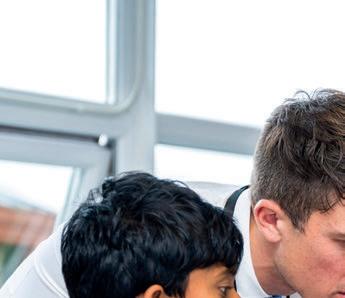

alleyns.org.uk














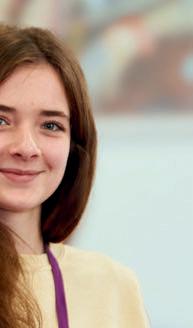












At








Help with school fees
Find





Bursaries of up to 100% of fees are available




cityo ondonschool.org.uk


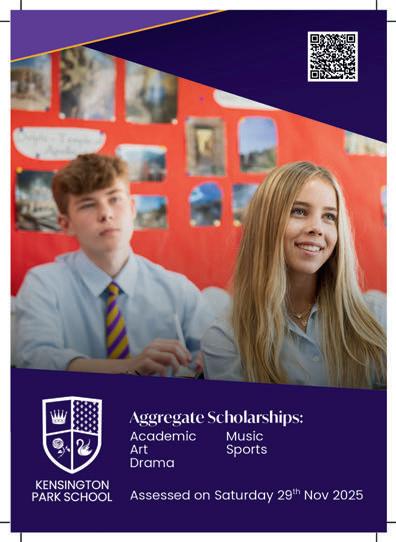



“I




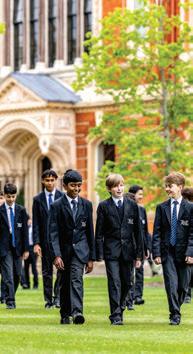







































Bursaries at 11+ and 16+
At Latymer Upper School, students are provided a forward-thinking and interdisciplinary education. We offer one of the UK’s most generous fee-assistance programmes to academically able students, up to 100% fee reduction.
latymer-upper.org/admissions/bursaries
Latymer Upper School King Street Hammersmith W6 9LR 0208 148 4519
admissions@latymer-upper.org @LatymerUpperSchool
COUNTRY SCHOOLS

Christ’s Hospital School in West Sussex educates children aged 11 to 18


FROM OUR CULTURE COMES STRENGTH
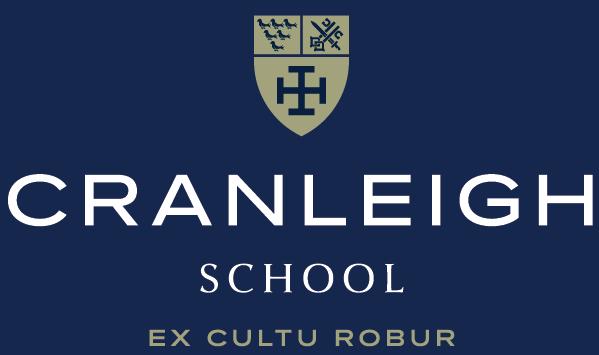

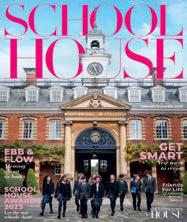









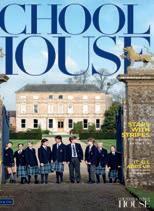








To advertise in the next issue of School House Magazine, or on our website www.countryandtownhouse.com/schools, please email Camilla van Praagh on camilla@schoolhousemagazine.co.uk

















To nd out more, we invite you to come and visit King Edward’s School. Please contact our Admission’s team on 01225 820 399 to arrange a tour. For further details, please visit kesbath.com









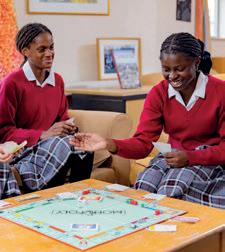


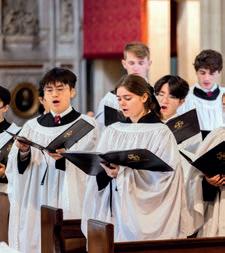
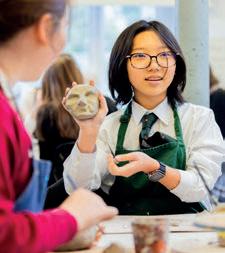
• Co-educational day & boarding school for pupils aged 11-18
• New Sixth Form Centre opened in September 2024
• Full daily minibus service available from Bath and surrounding villages

• Set in an outstanding Somerset location near Bath & Bristol and with easy access to London
• Awarded ‘Outstanding’ in all categories by Catholic Schools Inspectorate May 2024
• Organ, choral, music, art, drama, sports, academic, product design & all-rounder scholarships available + means-tested bursaries
OPEN MORNINGS: 11 OCTOBER 2025, 7 MARCH & 16 MAY 2026
call issy hartnell on 01761 235103 or email
admissions@downside.co.uk to find out more


















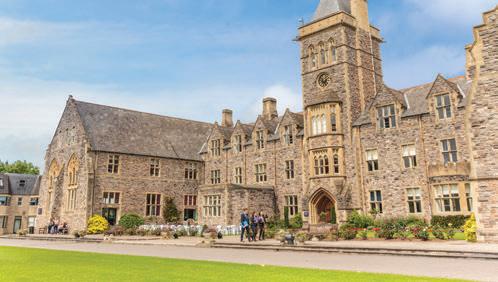
SCHOLARSHIPS AT TAUNTON SCHOOL
We warmly invite students to discover the benefits of an inspiring education here at Taunton School and apply for our scholarship opportunities with 2026 entry into Year 7, Year 9 and Sixth Form.


Girls First: Empowered, Encouraged, Engaged
Inspiring the Next Generation of Women in STEM
Roedean provides so many opportunities to inspire a sense of curiosity, innovation, and lifelong confidence.

Shaping the Future
Roedean inspires girls to embrace STEM with confidence, curiosity, and ambition. This year, 43% of A Level students progressed to STEM degrees, far above the national average. Destinations include Oxford and Cambridge for Medicine, Computer Science, Architecture, and Veterinary Medicine, as well as Theoretical Physics, Natural Sciences, and Mathematics at leading universities. These successes reflect both the strength of our teaching and the futures our students are shaping.
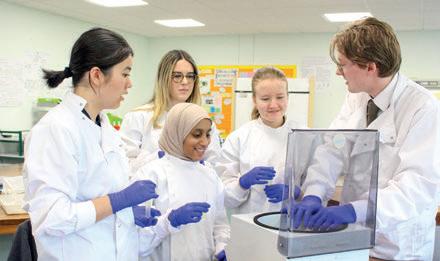
Curiosity from the Start
From Year 7, girls explore coding and AI Media Literacy, while industry leaders spark ambition, most recently with a talk on nano-technology. Our STEM Ambassador, a Professor of Space Physics, even guided students in building and launching rockets.

A Learning Environment Like No Other
Roedean nurtures independent and confident thinkers. Beyond academics, a passion for STEM is fostered through clubs such as Forensic Science Explorers, MeDeVet+, Astronomy Club, and Physics Olympiad, to name a few, where girls push boundaries, experiment boldly, and innovate. Future vets can even gain hands-on experience on our Farm, while teamwork and creativity shine in the annual F24 electric car challenge.
Pathways to STEM Careers
In the Sixth Form, Roedean’s specialist STEM pathways ignite ambition and open doors to the future. From the fields of biomedical engineering to artificial intelligence, girls gain the skills, knowledge, and confidence to thrive in the world’s fastest-growing fields. Unfettered by societal pressures about girls and science, Roedean students secure places every year at leading universities to study STEM, proving that, with vision, courage, and purpose, they are ready to change the world.
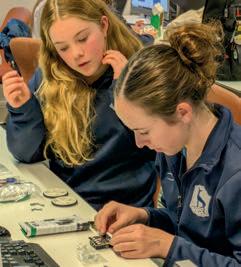
“43% of students progress to STEM-related degrees” Book your Roedean visit today and discover the future our girls are building.























AGES 3-18
Another world awaits




Established for over 430 years | High academic reputation
75+ co-curricular activities | Unrivalled facilities
Over 34 pupil nationalities | 1,000 acre estate
Days in October
Co-ed 3-18 | Boarding & Day | Jesuit, Catholic School





Scan the QR code to book your place




DIRECTORY
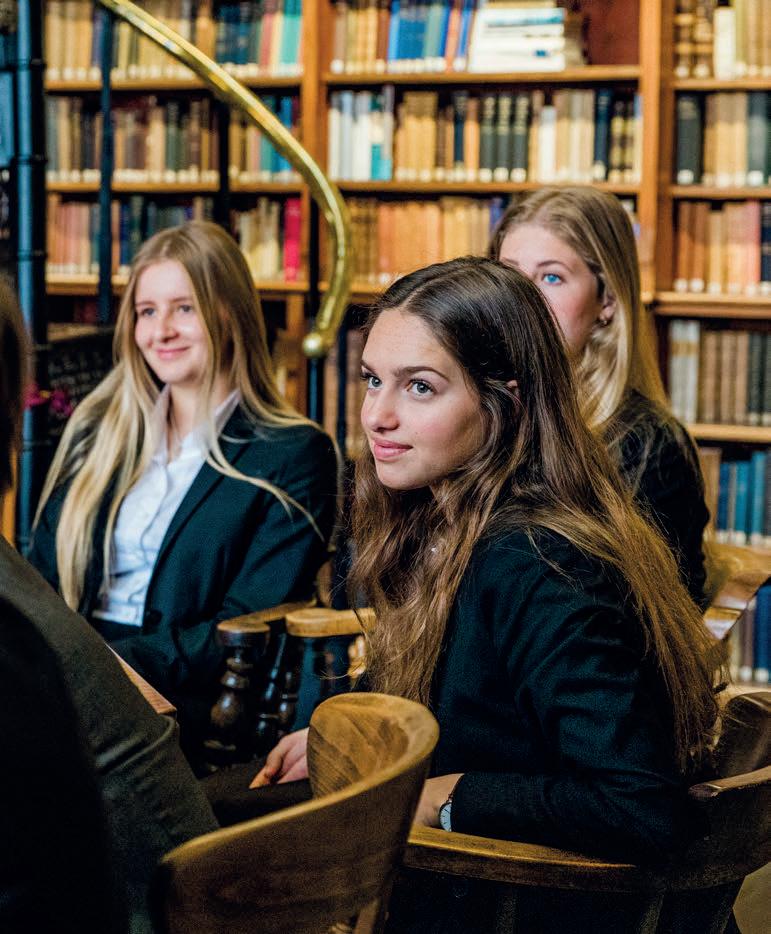
Stonyhurst College, Lancashire is a Catholic school for pupils three to 18
London
55 Alleyn’s School Townley Road, Dulwich SE22 8SU T: 020 8557 1500 alleyns.org.uk
55 Ashbourne College 17 Old Court Place, Kensington W8 4PL T: 020 7937 3858 ashbournecollege.co.uk
56 City of London School 107 Queen Victoria Street, London EC4V 3AL T: 020 3680 6300 cityoflondonschool.org.uk
56 Dulwich College Dulwich Common, London SE21 7LD T: 020 8693 3601 dulwich.org.uk
6 Godolphin and Latymer School Iffley Road, Hammersmith W6 0PG T: 020 8741 1936 godolphinand latymer.com
58 Hornsby House School Hearnville Road, London SW12 8RS T: 020 8673 7573 hornsbyhouse.org.uk
59 James Allen’s Girls’ School (JAGS) 144 East Dulwich Grove, London SE22 8TE T: 020 8693 1181 jags.org.uk
56 Kensington Park School, Senior 40-44 Bark Place, W2 4AT T: 020 7616 4400 kps.cp.uk
56 Kensington Park School, Sixth Form 59 Queen’s Gate, SW7 5JP T: 020 7225 0557 kcs.org.uk
57 King’s College School Wimbledon Southside, Wimbledon Common SW19 4TT T: 020 8255 5329 kcs.org.uk
58 Latymer Upper King Street, Hammersmith W6 9LR T: 020 8629 2024 latymer-upper.org
IFC MPW London
1 90–92 Queen’s Gate, London SW7 5AB
T: 020 7835 1355 mpw.ac.uk
IBC Simply Learning Tuition and Consultancy 17 Kensington Court Place, London W8 5BJ
T: 020 7350 1981 simplylearningtuition. co.uk
7 St Philip’s School 6 Wetherby Place, London SW7 4NE
T: 020 7373 3944 stpschool.co.uk
24 London Park
25 School Clapham
7-11 Nightingale Lane, London SW4 9AH
T: 020 8161 0305 londonparkschools.com
24 London Park
25 School Hybrid 106 Piccadilly, London W1J 7NL
T: 020 7491 7393 londonparkschools.com
24 London Park
25 School Mayfair 106 Piccadilly, London W1J 7NL
T: 020 7491 7393 londonparkschools.com
24 London Park
25 School Sixth 79 Ecclestone Square, London SW1V 1PP
T: 020 7491 7393 londonparkschools.com
23 Thomas’s Battersea Kindergarten
St Mary’s Church, Battersea Church Road, London SW11 3NA
T: 020 7978 0620 thomas-s.co.uk
23 Thomas’s Battersea 28-40 Battersea High Street, London SW11 3JB
T: 020 7046 1457 thomas-s.co.uk
23 Thomas’s Clapham Broomwood Road, London SW11 6JZ T: 020 7326 9300 thomas-s.co.uk
23 Thomas’s Fulham 49 Hugon Road, London SW6 3ES
T: 020 7751 8200 thomas-s.co.uk
23 Thomas’s Kensington 17-19 Cottesmore Gardens, London W8 5PR
T: 020 7361 6500 thomas-s.co.uk
23 Thomas’s College Queen’s Road, Richmond Hill, Richmond TW10 6JW
T: 020 7978 0902 thomas-s.co.uk
61 Badminton School Westbury Road, Bristol BS9 3BA T: 01179 055200 badmintonschool.co.uk
19 Brighton College Eastern Road, Brighton BN2 0AL T: 01273 704200 brightoncollege.org.uk
9 Christ’s Hospital Horsham, West Sussex RH13 0LJ T: 01403 211293 christs-hospital.org.uk
61 Cranleigh School Horseshoe Lane, Cranleigh, Surrey GU6 8QQ T: 01483 273666 cranleigh.org
63 Downside School Stratton-on-the-Fosse, Radstock, Somerset BA3 4RJ T: 01761 235100 downside.co.uk
OBC Hurtwood House Holmbury St Mary, Dorking, Surrey RH5 6NU T: 01483 279000 hurtwoodhouse.com
62 King Edward’s School, Bath North Road, Bath BA2 6HU T: 01225 464313 kesbath.com
2 Lancing College Lancing, West Sussex BN15 0RW T: 01273 452213 lancingcollege.co.uk
62 Marlborough College
Bath Road, Marlborough, Wiltshire SN8 1PA T: 01672 892200 marlboroughcollege.org
8 Merchant Taylors’ School
Sandy Lodge, Northwood HA6 2HT T: 01923 820644 mtsn.org.uk
64 Queen Ethelburga’s Thorpe Underwood Estate, York YO26 9SS T: 01423 333330 qe.org
68 Reed’s School
Sandy Lane, Cobham, Surrey KT11 2ES T: 01932 869044 reeds.surrey.sch.uk
67 Roedean School Roedean Way, Brighton BN2 5RQ T: 01273 667500 roedean.co.uk
32 Royal Grammar School Guildford High Street, Guildford GU1 3BB T: 01483 880600 rgsg.co.uk
65 Rugby School Lawrence Sherriff Street, Rugby, Warwickshire CV22 5EH T: 01788 556216 rugbyschool.co.uk
68 St Catherine’s School, Bramley Station Road, Bramley, Guildford GU5 0DF T: 01483 893363 stcatherines.info
5 St Edward’s Oxford Woodstock Road, Oxford OX2 7NN T: 01865 319204 stedwardsoxford.org
66 St Mary’s Calne
63 Curzon Street, Calne SN11 ODF T: 01249 857200 stmaryscalne.org
69 Stonyhurst College Clitheroe, Lancashire BB7 9PZ T: 01254 826345 stonyhurst.ac.uk

66 Taunton School Staplegrove Road, Taunton, Somerset TA2 6AD T: 01823 703703 tauntonschool.co.uk
